Welcome to Essential Politics, our in-the-moment look at California political and government news.
Sign up for our free newsletter for analysis and more, and subscribe to the California Politics Podcast. Don’t miss our Essential Politics page in Sunday’s California section.
- Share via
L.A. billionaire Eli Broad donates $1.5 million to pro-charter school group supporting Villaraigosa for governor

Los Angeles billionaire and philanthropist Eli Broad donated $1.5 million on Thursday to a pro-charter school group supporting Antonio Villaraigosa’s candidacy for governor.
The contribution came one day after Netflix chief Reed Hastings donated $7 million to the same group, Families & Teachers for Antonio Villaraigosa for Governor 2018, which is sponsored by the California Charter Schools Assn. Advocates, according to the California secretary of state’s office.
Broad and Hastings are wealthy backers of the education-reform movement. Villaraigosa is the most prominent California Democrat to back the effort to reform traditional protections for teachers that are a key priority for teachers’ unions. His stance has made him a target of those unions and many other labor groups, in part because of his roots as a labor organizer.
It’s unclear what the independent expenditure group plans to do with the millions of dollars in donations, but it could boost Villaraigosa’s chances against Lt. Gov. Gavin Newsom, who leads in the polls and fundraising. Newsom is backed by the powerful California Teachers Assn. and other education unions.
The charter school association has previously been successful in local elections, notably last year when its efforts led to the first Los Angeles Unified School District board majority of elected officials with major pro-charter financial support.
- Share via
Petition drive to repeal California gas tax increase temporarily slows down

Paid signature-gatherers for a ballot measure that would repeal gas tax increases may be hard to find on the streets of California this week.
Organizers say it’s not a money issue, adding that they needed to briefly halt paid signature-gathering to catch up on collecting petitions from volunteers.
The petition drive has so far collected more than 327,800 verified signatures of the 587,407 needed to qualify the measure for the November ballot, according to Dave Gilliard, the political strategist behind the drive.
“We knew it was popular but the incredible pace is even faster than we expected so we outran the capacity of our verification operation over the Christmas holiday and told our crew managers to slow down so we could catch up,” Gilliard said. “We will be back up to speed by the end of this week.”
The gas tax and vehicle fee increases signed by Gov. Jerry Brown are expected to raise $5.2 billion annually for road and bridge repairs and expanded mass transit. The gas tax jumped from 18 cents to 30 cents per gallon on Nov. 1, and vehicle fees of at least $25 kicked in Jan. 1.
“The gas tax repeal petition is breaking records for both paid and volunteer signatures and we’re using the next two weeks to catch up on validation of signatures already received,” said Carl DeMaio, a former San Diego City Councilman and conservative radio talk-show host. “As a grass-roots-funded effort we are also continuously raising funds and volunteer support. We are highly confident we’ll qualify this Initiative for the November 2018 ballot.”
- Share via
State pot bureau ready to enforce California’s new marijuana laws as license applications flood in
The state has issued 104 licenses for retail stores to sell marijuana for recreational use in California and 239 other applications for those permits are pending, officials said Tuesday.
An official with the state Bureau of Cannabis Control added that the agency is prepared to begin taking enforcement action against pot shops that are not properly licensed.
“The bureau’s enforcement team is ready to respond to any complaints it receives and start doing compliance checks and site visits at any time,” said Alex Traverso, a spokesman for the bureau.
Selling marijuana without a license is a crime punishable by up to six months in county jail and a fine of up to $500. Those convicted of engaging in any marijuana business activity without a license will also be subject to a civil penalty of up to three times the amount of the license fee for each violation.
A new report issued Tuesday indicated the bureau has issued 478 temporary licenses to firms to test, distribute and sell medical and recreational marijuana, which began Jan. 1 after voters approved a legalization initiative, Proposition 64, in 2016. Businesses have received 153 licenses to sell marijuana for medical use.
Another 1,458 firms have applied for licenses that are still being processed.
The state Department of Food and Agriculture has separately issued 207 licenses to marijuana growers.
- Share via
Two possible instances of discrimination reported after California issues driver’s licenses to immigrants here illegally
The California Research Bureau on Tuesday released its first report on incidents of discrimination under a 2015 state law that has provided driver’s licenses for hundreds of thousands of immigrants here illegally.
Researchers found no complaints have been made against government agencies tasked with enforcing anti-discrimination laws. But two possible instances of discrimination were reported in focus group interviews conducted by Drive California, a coalition of advocates studying the impact of the new law.
In one case, a woman in Fresno was told her license was not a valid form of identification at a retail store, though it was unclear “whether the incident reflected intentional discrimination or simple ignorance of the license marking,” the report states.
A MoneyGram clerk in another case denied a license holder the ability to cash a check. The same person was later rejected again at a bank.
The state Department of Motor Vehicles has issued 960,000 AB 60 driver’s licenses as of Nov. 30. The state research bureau produced the report for the Legislature as part of the new law, which declares discrimination against an AB 60 license holder a violation of the Unruh Civil Rights Act.
- Share via
California lawmaker proposes requiring panic buttons for hotel workers in response to widespread sexual harassment
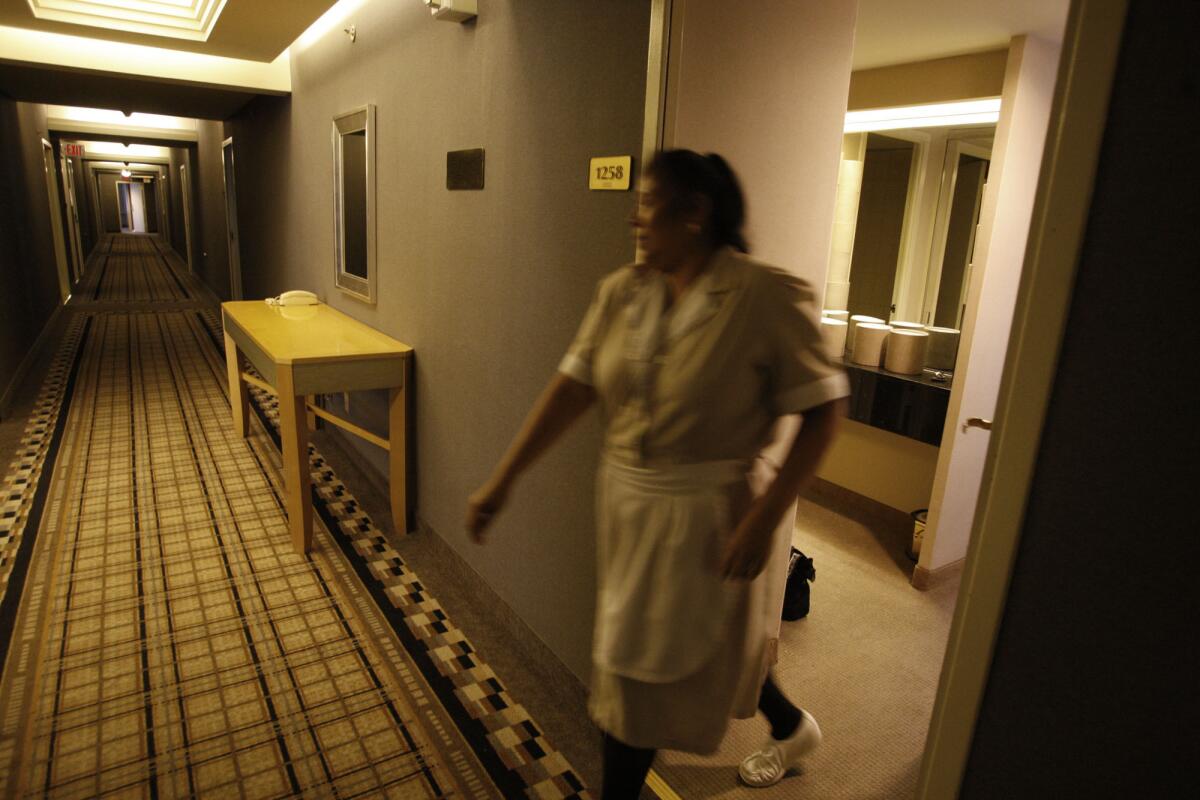
Alarmed by a survey indicating sexual harassment of hotel housekeepers is widespread, a California state lawmaker on Tuesday proposed requiring employers to provide “panic button” devices to their employees so they can summon help if abused by a guest.
The bill to be introduced Wednesday by Assemblyman Al Muratsuchi (D-Torrance) would also require individual hotels to impose a three-year ban on guests who engage in harassment on the property.
“We want to protect our most vulnerable women workers, hotel maids who are going into rooms alone, from sexual harassment,” said Muratsuchi, who co-authored the bill with Assemblyman Bill Quirk (D-Hayward).
The legislation signals that concerns over sexual harassment that dominated the state Legislature last year will continue to be an issue for lawmakers as they begin the new legislative year Wednesday.
Harassment allegations against Hollywood producer Harvey Weinstein, comedian Louis C.K. and other high-profile men have involved sexual misconduct in hotel rooms.
A survey in July by Unite Here Local 1 found that 49% of female hotel workers in Chicago had experienced a guest answering the door naked or exposing himself. The report titled “Hands Off, Pants On,” found 58% of hotel workers said they had been sexually harassed by a guest.
California’s Unite Here Local 11 has been calling for the action proposed in the legislation.
“It is the intent of this measure to protect hotel employees from violent assault, including sexual assault, and sexual harassment, and to enable those employees to speak out when they experience harassment on the job,” said the introduction to the legislation introduced by Muratsuchi.
In addition to requiring hotels to provide panic buttons to employees who work alone in rooms, the bill requires hotels to take written complaints from employees and keep them for five years. Any complaint backed by evidence including a statement given under penalty of perjury would result in a guest being banned from a hotel for three years.
Hotels would also be required to post a notice on the inside of hotel room doors warning guests about the consequences of sexual harassment.
Updated at 4:10 pm to include comment from Assemblyman Muratsuchi.
- Share via
Money, Republican malaise and Tom Steyer: These are the things to watch for in California’s 2018 statewide elections
Get ready, California. What had been a behind-the-scenes dash for cash closely watched by few other than political observers is about to burst into public view.
Voters this year will decide who will succeed Democrat Jerry Brown as the next governor and whether they will send Sen. Dianne Feinstein back to Washington.
Before the June 5 primary, candidates will ramp up their campaigns with messages on television and stuffed into mailboxes. Here’s a primer on the state’s two marquee races.
- Share via
This dispute over candidate endorsements is dividing the California Democratic Party
It’s up to a few thousand California Democratic Party delegates to decide whether the state party endorses candidates at its February convention in San Diego — a nod that could come with millions of dollars of support.
But this month, California Democratic Party Chairman Eric Bauman sent a letter to statewide candidates urging them not to seek the state party endorsement in February, prompting allegations that he was trying to silence dissenting voices. Bauman said his letter was simply meant to stave off disunity at the convention.
The dispute over endorsements is the latest battle between Bauman and those who backed his rival, Kimberly Ellis, in a bitter leadership contest in the spring that was decided by a handful of votes and resulted in a recount. Party delegates split into establishment and grass-roots factions, aligning themselves with Bauman and Ellis respectively, mirroring the divide among Democrats in deciding between Hillary Clinton and Bernie Sanders in the 2016 presidential primary.
- Share via
Fickle L.A. County is pivotal in the race for California governor
Home to a quarter of California’s 5.2 million registered voters, Los Angeles County is the biggest prize in California’s 2018 race for governor.
For two hometown Democratic candidates especially — former Los Angeles Mayor Antonio Villaraigosa and state Treasurer John Chiang of Torrance — doing well in L.A. County is essential if they hope to best the front-runner, Lt. Gov. Gavin Newsom.
Yet this overwhelmingly Democratic stronghold continually bedevils even the most adept campaigns.
- Share via
A renewed brawl over single-payer healthcare in California is on deck for 2018

California officials are bracing for healthcare battles in Washington to have a major impact on the state’s budget and programs. Activists and politicians are planning a showdown over whether or not to establish a single-payer healthcare system in the state. And prescription drug manufacturers are the target of a number of bills meant to target the rising costs of medication.
Sound familiar? Turns out the brewing healthcare battles in California in 2018 aren’t all that different from those from 2017.
Here’s a primer on the upcoming healthcare agenda in California:
- Share via
A guide to figuring out whether California will flip the House for Democrats this fall
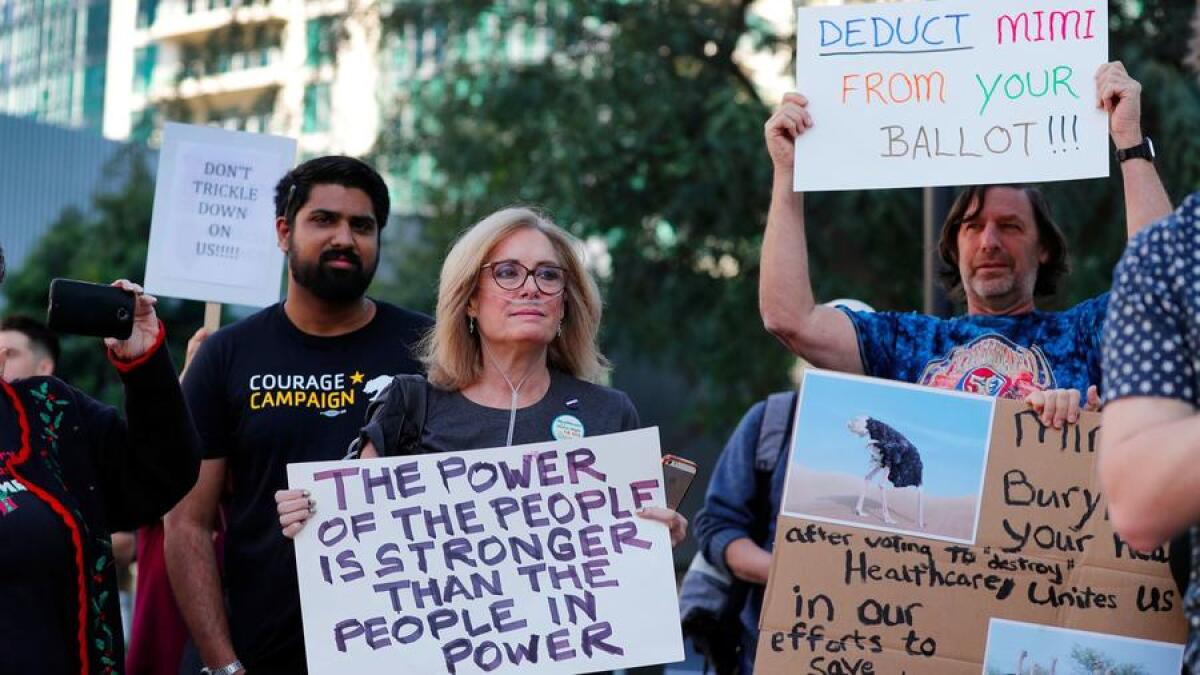
Now that the year of the midterm election has arrived, the battles will start to pick up speed as Democrats try to reclaim control of the House.
The path to the 24 seats Democrats need passes through California — and that means they need to win at least a handful of the Republican seats they hope to flip.
As the contests take shape, we’re watching a few things to get a sense of what the 2018 election might bring.
- Share via
How California lawmakers plan to protect the online privacy of consumers in 2018

With federal regulation rollbacks and a rise in data breaches, California lawmakers this year are looking for ways to protect consumers and their personal information.
Some legislation under consideration could give people more notice and control over what data is collected, without having to pay for privacy or better services. Other bills could provide free credit freezes for consumers and require new privacy features for products that connect to the internet.
- Share via
2018 will see California motorists pay more to the state to repair roads and bridges
The new year brings with it new vehicle fees in California ranging from $25 to $175 depending on the value of your car, but Republican lawmakers are hoping to qualify a ballot measure in November to repeal the higher charges.
The fees and a 12-cent increase in California’s gas tax last year are part of a plan by Democrats to raise more than $5.2 billion annually to deal with a backlog of road and bridge repairs.
Petitions to qualify a repeal initiative are circulating now.
- Share via
A rent control battle tops the list of California housing issues to watch in 2018

California lawmakers aren’t wasting any time in tackling one of the most contentious issues in state housing politics this year.
On Jan. 11, the Assembly Housing and Community Development Committee is set to hold a hearing on legislation that could lead to a dramatic expansion of rent control policies across the state.
The debate over rent control could spill over onto the 2018 ballot, where Californians also could see proposals to expand or curtail the property tax restrictions ushered in 40 years ago by Proposition 13.
Lawmakers will have to wrestle with how to follow up a package of housing bills that passed last year. The measures provided new funding and regulations designed to encourage homebuilding, but are unlikely to make an appreciable difference in housing costs.
- Share via
6 things you probably didn’t know about the Californians in Congress
California’s 55 members of Congress make up the largest and most diverse delegation in the country.
From favorite movies to military commendations, check out our list of six things you may not know about them:
- Share via
Assemblyman Sebastian Ridley-Thomas is resigning
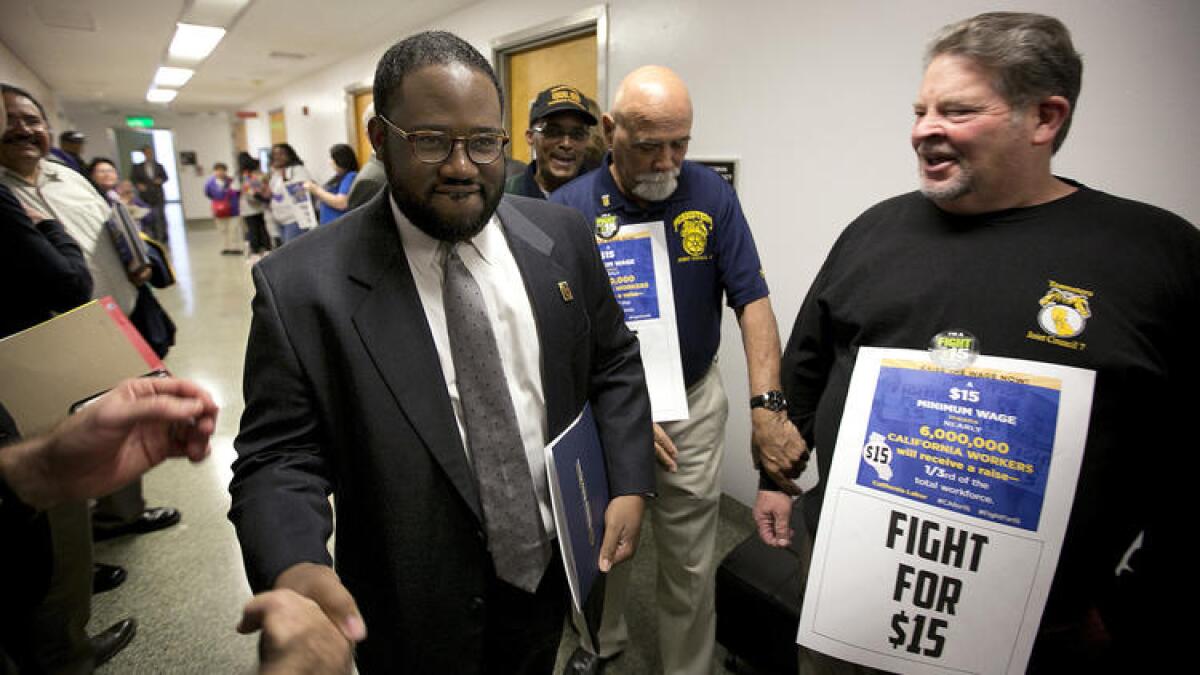
Assemblyman Sebastian Ridley-Thomas abruptly announced his resignation from the California Legislature on Wednesday, citing health reasons.
Ridley-Thomas, a Democrat from Los Angeles, informed Speaker Anthony Rendon (D-Paramount) Tuesday night.
“The reason for this difficult decision is that I am facing persistent health issues,” Ridley-Thomas, 30, said in a written statement on Wednesday. “On December 18th, I underwent surgery for the fifth time this year. Although I expect a full recovery, my physicians advise that I will need an extended period of time to recuperate.”
Earlier this year, Ridley-Thomas was absent from work for more than two weeks. Staff members initially said the absence was a personal leave, then said the time off was due to unspecified medical reasons. His resignation letter on Wednesday offered no additional details.
“When I resume public life, I intend to remain active in civic affairs, where my passion lies,” he said in the statement released by his office.
Ridley-Thomas was first elected to the Assembly in a 2013 special election. He is the son of Los Angeles County Supervisor Mark Ridley-Thomas. Before winning elected office at age 26, the younger Ridley-Thomas worked as an aide for Los Angeles City Councilman Curren Price and managed a 2012 Assembly campaign in San Bernardino County.
In a statement about his son’s decision, Mark Ridley-Thomas said he and his wife “more than anyone, have seen him struggle with health challenges this year, and we fully support his decision to step down from the state Legislature so that he can recuperate with complete rest, in accordance with his doctor’s orders.”
His solidly Democratic district includes the west Los Angeles neighborhoods of Westwood, Culver City, Crenshaw and Baldwin Hills. He is chairman of the influential Assembly Revenue and Taxation Committee, which oversees all tax-related legislation. Ridley-Thomas is a proponent of changes in the operation of the state Board of Equalization, though his plan would have allowed the agency to ultimately retain many of its duties. A more substantial shake-up was signed into law by Gov. Jerry Brown in June.
Ridley-Thomas was the author of a bill signed into law in October giving the Los Angeles Unified School District the power to preserve some of its existing single-gender schools. He was unsuccessful, though, in an effort to stop local governments from imposing taxes on streaming video services like Netflix and Hulu.
Ridley-Thomas’ departure will require a special election in 2018. He is the fourth Southern California legislator to leave office this year. The election of Rep. Jimmy Gomez (D-Los Angeles) to Congress also required a special election. The other two lawmakers— Assemblymen Raul Bocanegra (D-Pacoima) and Matt Dababneh (D-Woodland Hills) — stepped down in the wake of allegations of sexual misconduct, which both men have denied. A special election to fill Bocanegra’s seat will be held on April 3, with a potential runoff on June 5. A special election date has not yet been set for Dababneh’s seat.
“My colleagues and I wish Assemblymember Sebastian Ridley-Thomas all the best going forward as he deals with his health challenges,” Rendon said in a statement. “The Assembly will continue to assist the residents of the 54th Assembly District until a new assemblymember is seated.”
This post was updated with comment from Assembly Speaker Anthony Rendon and Los Angeles County Supervisor Mark Ridley-Thomas, as well as more information about special elections. It was originally published at 11:10 a.m.
- Share via
Former California Secretary of State March Fong Eu to be honored in Sacramento
- Share via
California Senate Democrats are considering some ideas to counter the GOP tax plan
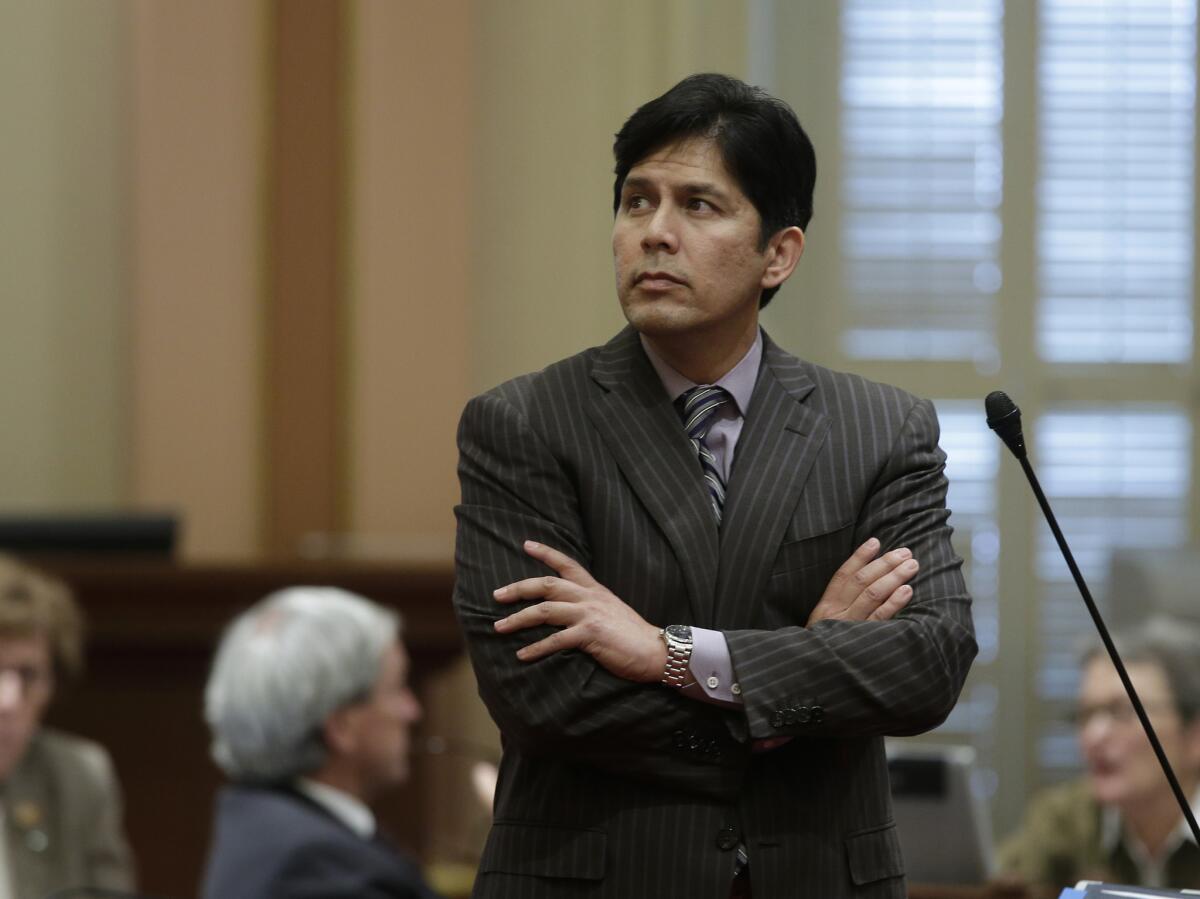
Democrats in the California Senate are planning to write legislation to lessen the effects of the elimination of popular tax breaks in the GOP’s overhaul of the federal tax system.
To finance broad-based corporate tax cuts and reductions in individual tax rates, the GOP plan caps the deductibility of state and local income and property taxes — a benefit used often in suburban areas of California.
“The Republican tax scam disproportionately harms California taxpayers,” Senate President Pro Tem Kevin de León (D-Los Angeles) said in a statement. “Our hard-earned tax dollars should not be subject to double-taxation, especially not to line the pockets of the Trump family, hedge fund managers and private jet owners.”
De León, who also is running for U.S. Senate, said the state Senate is working with law professors at UCLA, UC Davis and the University of Chicago to develop the legislation.
Ideas being considered, according to a de León spokesman, include:
- Reducing state personal income taxes through a tax credit program and offsetting that amount through payroll taxes.
- Allowing individuals to make voluntary gifts to the state of California, which would be deductible as a charitable donation under federal law. The deduction for the donated amount would replace the state and local tax deduction.
Lawmakers return to Sacramento in January.
- Share via
L.A. Mayor Eric Garcetti admits considering a 2020 bid: ‘I am thinking about this’
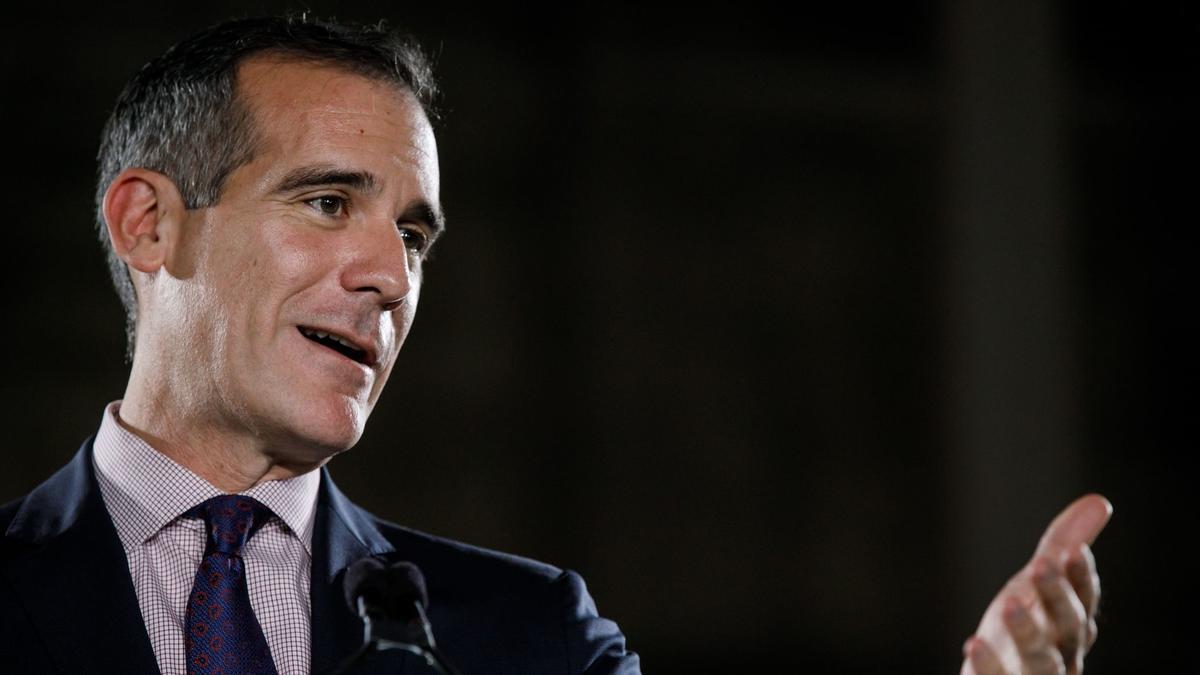
It’s no secret Los Angeles Mayor Eric Garcetti is interested in running for president.
When reporters ask about his intentions, he has used all sorts of ways to deflect, typically by saying he’s focused on his day job — for the moment.
But speaking in Spanish to a Univision reporter this week, Garcetti edged ever closer to the telltale admission he’s actually considering it.
“I am thinking about this,” said Garcetti, who is partly of Mexican heritage but learned Spanish attending private school. “The majority of time goes to my work as mayor of Los Angeles, but every [citizen] should think about what our role is in these difficult times, in these dangerous times.”
Garcetti added that he expects many mayors to run for president, and noted New York City Mayor Bill de Blasio recently visited Iowa, which holds the first presidential nominating contest.
Garcetti has long been rumored to be flirting with a White House bid, and he has fueled such speculation by traveling out of state to places such as the early presidential primary state of New Hampshire to campaign for a mayoral candidate.
- Share via
Gov. Brown makes judicial appointments, including attorney who helps train Legislature on anti-sexual-harassment policies
- Share via
The California Housing Crisis Podcast’s predictions for 2018
After a big year in 2017, California’s housing affordability crisis is going to be another major topic in state politics.
On the 2018 docket, lawmakers will tackle rent control and voters statewide could see many housing-related ballot measures, including a $4-billion bond primarily to fund new low-income developments and potential major changes to Proposition 13’s property tax restrictions.
On this week’s Gimme Shelter: The California Housing Crisis Podcast, we debate all those topics, highlight the effects of the GOP federal tax plan on California housing and interview Amy Thoma Tan, who works in public affairs, about what it’s like to purchase a new home in Sacramento’s hot real estate market.
Gimme Shelter, a podcast covering why it’s so expensive to live in California and what the state can do about it, is recorded every two weeks and features Liam Dillon, who covers housing affordability issues out of the Los Angeles Times’ Sacramento bureau, and Matt Levin, data reporter for CalMatters.
- Share via
California’s former top cop forms marijuana distribution firm in new age of legalization
Former California Atty. Gen. Bill Lockyer is going from enforcing laws against marijuana to legally distributing the drug under the state’s new rules that allow the sale and possession of pot for recreational use.
With state-licensed sales of marijuana starting Jan. 1, Lockyer has co-founded a firm, C4 Distro, that will distribute packaged marijuana concentrates and edibles to stores in Los Angeles.
He says California’s new regulated system has a chance to be a model for the rest of the country.
“For me as somebody who was on the law enforcement side for so many years, I saw the inadequacies of the effort to regulate something just by calling it illegal,” Lockyer said. “I think legalizing will help stabilize and help legitimize this industry and result in better consumer protection and other public benefits.”
Lockyer, a Democrat who served in the state Assembly and was leader of the state Senate, has co-founded the firm with Eric Spitz, who was chairman and president of the former parent company of the Orange County Register.
The businessmen aim to get their products to pot shops in L.A. in late January or early February, Spitz said.
Asked if he uses marijuana himself, Lockyer, 76, said, “Not in any recent times, but there were college years.”
He said he sees his involvement in the marijuana industry as a mixture of helping to pay for his kids’ college tuition and public service to help the new regulations work. “This whole industry has to come from the dark side to the light,” he said.
By focusing on delivery to as many as 700 stores that might open in Los Angeles, C4 Distro hopes to capture a targeted market while other firms distribute statewide. The business has a warehouse in southeast Los Angeles County and is close to applying for a distributor’s license from the state, Lockyer said.
Lockyer served a quarter century in the state Legislature before he was elected as state attorney general in 1999. He left that office in 2007 when he was elected as state treasurer, serving until his retirement from politics in 2015.
Before co-leading a group that bought the Register newspaper in 2012, Spitz served as chief financial officer at Narragansett Brewing Company. Spitz left the Register’s Freedom Communications in 2016.
2 p.m.: An earlier version of this article mistakenly said Spitz left Freedom Communications in 2015.
- Share via
House passes disaster aid bill with wildfire funding, 18 Californians vote no

Eighteen of California’s 53 House members voted no on an $81-billion disaster aid package Thursday, which includes funds for California’s recent wildfires.
The 17 Democrats and one Republican voted no on the bill, which passed the House by a 251 to 169 vote.
The Senate is not expected to take up the bill until January, when Congress returns from its holiday break.
The entire California delegation had recently signed onto a letter asking for the disaster aid.
In a speech on the House floor before the vote, House Majority Leader Kevin McCarthy (R-Bakersfield) pleaded with colleagues not to take a political stance on a disaster aid bill.
“Don’t play politics on a vote to give aid to the people of Texas, to the people of Puerto Rico and to the Virgin Islands, to the people of Florida, and to the people of California that are still fighting the fires. Don’t play politics on a bill where you hope to maybe stop another. That would be the worst of any politics I’ve seen played here,” McCarthy said. “Here and now, right before Christmas, don’t vote against aid for Americans who just lost everything.”
Several of the Democrats who voted no also voted against the spending bill Thursday, and said that they felt they could not support either because the bills did not include Democratic priorities for the end of the year, including protections for people brought to the country illegally as children.
Others said the aid bill doesn’t provide enough money for California and doesn’t treat Puerto Rico and the Virgin Islands fairly in terms of competing for the funds.
The 18 representatives voting no were:
- Nanette Barragán (D-San Pedro)
- Karen Bass (D-Los Angeles)
- Tony Cardenas (D-Los Angeles)
- Judy Chu (D-Monterey Park)
- Lou Correa (D-Santa Ana)
- Anna Eshoo (D-Menlo Park)
- Jimmy Gomez (D-Los Angeles)
- Ro Khanna (D-Fremont)
- Barbara Lee (D-Oakland)
- Zoe Lofgren (D-San Jose)
- Tom McClintock (R-Elk Grove)
- Nancy Pelosi (D-San Francisco)
- Lucille Roybal-Allard (D-Downey)
- Linda Sanchez (D-Whittier)
- Jackie Speier (D-Hillsborough)
- Eric Swalwell (D-Dublin)
- Norma Torres (D-Pomona)
- Juan Vargas (D-San Diego)
- Share via
Three California House members cross party lines on spending bill to keep government open
Three California House members crossed party lines Thursday on a vote to pass a spending bill that will keep the government open until mid-January.
Democratic Reps. Jim Costa of Fresno and Raul Ruiz of Palm Desert joined the majority of Republicans to vote for the bill. Republican Rep. Duncan Hunter of Alpine joined Democrats to vote against it.
The bill, which funds the government through Jan. 19, passed the House 231 to 188, right before representatives left for the holidays.
Costa said in a statement that he voted yes because keeping the government open is Congress’ job, but he called the vote “a continuation of the dysfunction in Washington.”
“It further illustrates the damage that results from partisan politics and irresponsible leadership. It is unacceptable that we have to resort to funding the government for weeks at a time because we cannot sit down together — Democrats and Republicans — and negotiate a real budget bill,” Costa said.
Hunter’s staff said the congressman was concerned that military spending in the bill was extended for only a short period. He had wanted the spending to be extended until September.
- Share via
Poll points to all-Democrat runoffs in California races for governor and senator
Californians could see two Democrat-on-Democrat contests in the state’s premier races in 2018, according to a new poll released Thursday.
In the gubernatorial race, Lt. Gov. Gavin Newsom remains the front-runner with the support of 26% of likely voters in a Berkeley IGS poll. Former Los Angeles Mayor Antonio Villaraigosa came in second with the backing of 17%.
The poll found notable demographic differences in the two men’s bases of support. Newsom had strong leads in the Bay Area, where he once served as the mayor of San Francisco, as well as among white voters, liberals and the wealthy. Villaraigosa saw strong backing in Los Angeles County, among Latino voters and among those who earned less than $40,000.
Republicans splintered in the race, placing businessman John Cox and Assemblyman Travis Allen in a tie for third place with 9% each. Two other Democrats, state Treasurer John Chiang and former state schools chief Delaine Eastin, each won the support of 5% of likely voters.
If Republicans fail to consolidate behind a candidate in the June primary, voters will for the first time see no GOP candidate on the November ballot for governor.
It’s a repeat of what occurred in the 2016 U.S. Senate race, and what is likely to occur again in the 2018 U.S. Senate race if the field does not grow.
Sen. Dianne Feinstein has the support of 41% of likely voters in her reelection bid, but her rival, fellow Democrat Kevin de León, won the support of 27%, according to the poll. There is no GOP candidate in the race.
Feinstein, who has served in the Senate for a quarter-century, has enormous advantages in fundraising, name recognition and support among powerful political groups.
However, the poll found that nearly one-third of likely voters said they are undecided or would like to support another candidate.
- Share via
Sen. Dianne Feinstein says she will not back must-pass spending bill without fixes for ‘Dreamers’ and children’s healthcare
In a surprising reversal, California Sen. Dianne Feinstein announced Thursday that she will not vote for an end-of-year spending bill that does not include protections for people brought to the country illegally as children as well as funding for a children’s health insurance program.
“It’s absolutely unconscionable that Republicans are leaving these items out of their bill to fund the government,” she said in a statement Thursday.
Earlier this week, the Democrat said she would vote for the bill, which must be passed in order to keep the government open past Friday.
Feinstein’s reversal is largely symbolic because the Senate likely still has enough Democratic votes to pass a temporary spending bill and push off a deal for so-called Dreamers until the new year.
Feinstein had been facing pressure from advocates and one of her 2018 opponents for refusing to block the bill if it didn’t include protections for Dreamers, who had benefited from the Deferred Action for Childhood Arrivals program that President Trump ended in September. About a quarter of the nearly 800,000 so-called Dreamers live in California, and almost 2 million California children and pregnant women use the Children’s Health Insurance Program, which the state government says is expected to run out of money next month.
“I’ve talked with them, I’ve met with them, I understand their plight and it breaks my heart. In California, 200,000 DACA youth are living in fear. The government knows where they live, where they study and where they work, and unless Congress acts, they know the government can show up at any moment and deport them,” Feinstein said.
Protesters had flooded Feinstein’s California and Washington offices in recent days.
Some on the left in California have questioned whether Feinstein is too moderate for a state that feels it’s under attack by the new administration. Her most prominent 2018 opponent, Democratic state Senate leader Kevin de León, has tried to capitalize on her reluctance to block the spending bill.
An Institute of Governmental Studies at UC Berkeley poll released Thursday found Feinstein leading De León 41% to 27% among likely voters, with 32% of respondents saying they were undecided or would support another candidate. House Democrats who have pushed to block the spending bill in order to get a deal for Dreamers by the end of the year praised Feinstein.
Rep. Nanette Barragán of San Pedro, whose cousin is among the Dreamers anxiously waiting a resolution, said she spoke twice with Feinstein on Thursday morning.
“It was a really good conversation, and to see her take a stand and say “I’m with you guys’… is great to see,” Barragán said.
Congressional Asian Pacific American Caucus Chairwoman Judy Chu (D-Monterey Park) said she’s glad Feinstein took a stand.
“It sends a powerful message, and it shows that we can be even more unified on holding the line on Dreamers and the [spending bill],” she said.
Read MoreFOR THE RECORD
12:49 p.m. The poll was of likely voters, this post initially stated it was of registered voters.
UPDATE
11:26 a.m.: This post has been updated with reaction from the California congressional delegation.
This post was originally published at 10:07 a.m.
- Share via
California legislator wants to curb sexual harassment in Hollywood and eating disorders for models

A new proposal by a California assemblyman is taking aim at two of the more criticized phenomena in the entertainment industry: sexual harassment and unhealthy body standards for fashion models.
The legislation, by Assemblyman Marc Levine (D-San Rafael), would require the state’s Occupational Safety and Health Standards to adopt guidelines for fashion models in an attempt to combat the prevalence of eating disorders and excessive thinness in the industry.
This is the second time Levine has tried to take on the fashion industry. His similar bill to impose standards on models sputtered in 2016.
This time, Levine also is trying to address the prevalence of sexual harassment in the entertainment industry by requiring that talent agencies — which represent actors, performers and other artists — provide training on sexual harassment and how to identify and prevent inappropriate behavior.
“I believed women who told me their stories of abuse when I introduced legislation to provide workplace protections in the fashion industry in 2016 just like I believe them now,” Levine said in a statement. “It’s time that law reflects society’s rejection of sexual harassment in all workplaces, including Hollywood. My bill aims to address the problem before it starts, but also empowers survivors with the tools to report these cases.”
- Share via
Local Indivisible group picks Democrat to endorse against Rep. Duncan Hunter

With an already crowded field of contenders hoping to unseat Rep. Duncan Hunter and months to go before the candidate filing deadline, one local activist group has made an early endorsement in the race.
Indivisible CA50, made up of activists mostly in San Diego County, announced Thursday that it’s endorsing Ammar Campa-Najjar, a Democrat and public affairs consultant who’s challenging Hunter.
The endorsement comes as liberal activists and interest groups all over the state are grappling with whether — and how — to winnow down the dozens of candidates vying for 10 GOP-held seats in California.
The group held more than half a dozen endorsement meetings to allow members throughout Hunter’s district to vote on their preferred candidate. One of the candidates, Pierre Beauregard, dropped out of the race recently and endorsed Campa-Najjar.
In a statement Campa-Najjar said in a statement that the nod “represents the enthusiasm of hundreds of progressive grassroots activists.”
Indivisible’s national political director Maria Urbina said the endorsement was the first made by any California chapter in the 2018 midterms.
Aside from Campa-Najjar, two other Democrats are running for Hunter’s seat: Josh Butner, a school board trustee and former Navy SEAL, and realtor Patrick Malloy, who ran last year and lost to Hunter by nearly 27 percentage points.
Hunter will also face at least two GOP challengers: Shamus Sayed and Andrew Zelt. Hunter is not considered to be particularly vulnerable in next year’s election, but an investigation into his alleged misuse of campaign funds has caused at least one election handicapper to move his race from “solid Republican” to the “likely Republican” column.
- Share via
San Francisco is getting a new mayor and creating a political star. Who will it be?
San Francisco is the city everyone loves, even if they hate it.
The stately Victorians, like a gingerbread dream come to life. The majestic Golden Gate Bridge, standing like heaven’s portal above the fog. The plucky cable cars, scrabbling up its impossible hillsides.
It can almost make you forget the bands of ravaged homeless, the paralyzing traffic, the scent of human waste wafting from sidewalks outside the city’s posh eateries and palatial tech headquarters.
San Francisco is getting a new mayor, owing to the sudden death of incumbent Ed Lee. All of the grandeur, and all of the grit, accompany the position.
To say the race is wide open — Lee having died just about a week ago — is an understatement.
- Share via
Sen. Dianne Feinstein is under pressure over a fix for ‘Dreamers’
California Sen. Dianne Feinstein is under pressure from activists and fellow Democrats to withhold support for a spending bill that would avert a government shutdown in exchange for protections for people brought to the country illegally as children.
Feinstein said in October that protections for so-called Dreamers are “the most important thing we can get done,” but the senator known for her moderate bent said this week that she won’t try to block the end-of-the-year spending bill over it, and has not offered an explanation.
Dreamers this week flooded Feinstein’s five California offices and her office on Capitol Hill. Two UCLA students refused to leave her Capitol Hill office after three hours Tuesday and were briefly detained by police. On Wednesday, about a dozen students and parents returned and were asked to leave after about 30 minutes of shouting in her office lobby.
- Share via
Emily’s List endorses woman running against Rep. Darrell Issa
National abortion rights behemoth Emily’s List has made its next choice among California’s vast array of Democratic congressional challengers.
The group announced Thursday it’s endorsing Democrat Sara Jacobs, a former policy advisor for Hillary Clinton’s presidential campaign who most recently served as CEO of a New York nonprofit.
Jacobs, 28, is also the granddaughter of Qualcomm founder Irwin Jacobs and is the only woman so far to enter the race for Rep. Darrell Issa’s seat.
In a statement, Emily’s List president Stephanie Schriock called Jacobs a “passionate, energetic leader” who will “deliver a fresh, new approach to government that creates economic opportunity and works for Southern California families.”
Emily’s List included Issa in a list of seven GOP members in California that they’re looking to unseat next year. So far, the group has backed pro-abortion-rights female candidates in four of them.
Issa is considered by many election observers to be the most vulnerable congressional incumbent. He won his reelection campaign by just 1,621 votes last year against Democrat Doug Applegate, who is also running this year. In addition to Applegate and Issa, Jacobs will face Democrats Mike Levin and Paul Kerr.
- Share via
The GOP tax plan passed. Now Democrats have another big issue to use in the midterms
As GOP leaders in Congress met behind closed doors to hash out the details of their massive tax overhaul, a group of UC Irvine graduate students met in Rep. Mimi Walters’ district, fretting about how the plan could cost them money.
About 20 miles north, dozens of activists in top hats stood outside Rep. Ed Royce’s Brea office as they chanted, “Shame on you!”
And up in the Central Valley, protesters gathered outside Rep. Jeff Denham’s Modesto office to sing “Protest ye dreary congressman … Remember that he voted to take healthcare away. To save himself from taxes now, so you will have to pay.’
- Share via
Kevin de León to Feinstein: ‘Don’t come back’ to California without forcing a government shutdown over Dream Act
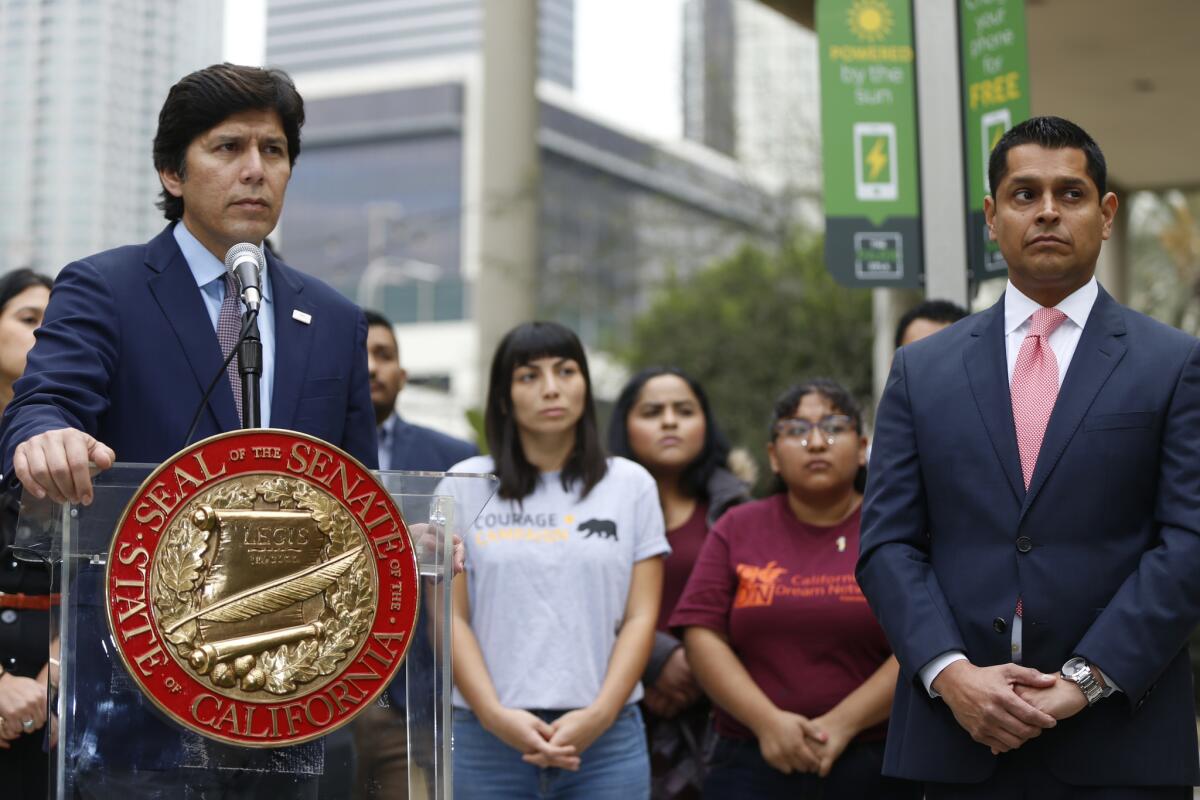
Taking direct criticism to the woman he is attempting to unseat in next year’s U.S. Senate race, California Senate leader Kevin de León on Wednesday urged Democrats to block a year-end spending bill as leverage to pass a Dream Act — “clean” of GOP demands for increased border security.
At a news conference in downtown Los Angeles, De León commended Sen. Kamala Harris for pledging to block the measure, saying he could not understand why her colleague Sen. Dianne Feinstein had failed to take a similar stance in pushing for legislation to protect the so-called Dreamers, immigrants brought to the country illegally as children.
“Dreamers make up hundreds of thousands of Sen. Feinstein’s constituents, and while talking a good game on Dreamers, when it comes to standing up and supporting them, she is AWOL,” said De León (D-Los Angeles), who has attempted to position himself to Feinstein’s left as he campaigns for her seat.
His statements follow days of demonstrations by young protesters at legislators’ offices in Washington and California. The coalitions of activists have been calling on Democrats to hold up the spending bill, a move that could force a government shutdown. They want to pass Dream Act legislation that would provide protections and a path to citizenship to young people without legal residency in the U.S.
At least two young protesters were arrested Tuesday outside of Feinstein’s Capitol Hill office, and more demonstrations took place at her offices in Washington and San Francisco on Wednesday.
Feinstein, House Minority Leader Nancy Pelosi (D-San Francisco) and Senate Minority Leader Charles E. Schumer (D-N.Y.) have sponsored Dream Act legislation but have not pledged to hold up the spending deal. A separate bipartisan group of senators is advocating punting the issue to January. President Trump has asked Congress to come up with a solution by March.
Standing next to De León and immigrant rights advocates on Wednesday, state Assemblyman Miguel Santiago (D-Los Angeles) said advocates had “to double down the shame on any Democrat” who thinks it’s time to wait on the issue.
De León said they had made that message clear to Schumer, saying, “It is time to find your spine, sir.” To Pelosi and Feinstein, he said: “Don’t come back to California if you haven’t demonstrated your leadership and your courage to stand up for these young men and women.”
“I can tell you this,” De León said. “If the Republicans were on the other side, they wouldn’t hesitate for a nanosecond to shut down the government to move forward what they believe in.”
- Share via
Rep. Zoe Lofgren loses race to lead Democrats on Judiciary Committee
Rep. Zoe Lofgren (D-San Jose) lost a vote Tuesday to become the highest-ranking Democrat on the House Judiciary Committee.
The House Democratic Caucus, by a 118-72 tally, instead picked Rep. Jerry Nadler (D-N.Y.) to replace outgoing Rep. John Conyers Jr.
Conyers (D-Mich.) recently agreed to step down amid sexual harassment allegations.
Lofgren, a former immigration lawyer serving her 12th term, was the third-most-senior Democrat on the committee. But when Conyers announced he was stepping down after 23 years as the panel’s senior Democrat, she made it clear that she didn’t intend to yield to Nadler, the second-most-senior Democrat on the committee.
Being the highest-ranking member of the minority party on a committee doesn’t hold much power. However, if Democrats win control of the House in 2018, the ranking member of the Judiciary Committee would take over leadership of the panel, which would be tasked with considering impeachment charges against President Trump if they are brought forward.
- Share via
12 California Republicans vote to support tax overhaul for a second time; Rohrabacher and Issa say no
The House gave final approval for the GOP tax bill Wednesday, with 12 Republicans in the state delegation again voting in favor of the bill.
Reps. Dana Rohrabacher of Costa Mesa and Darrell Issa of Vista voted no.
The House and Senate both passed the bill Tuesday, but, because Democrats raised procedural objections that forced the bill to be changed in the Senate, the House had to vote on the bill again Wednesday before sending it to President Trump for his signature.
Though many California taxpayers are expected to see an initial income tax cut under the plan, a significant number probably will have higher taxes because of the lost deductions. Analysts also expect the biggest cuts to flow to corporations and the state’s wealthiest residents.
Republicans are expected to head to the White House later Wednesday for a celebration with Trump.
No House Democrats, including the 39 from California, supported the bill. Rep. Grace Napolitano (D-Norwalk) was not present for the second vote, but she voted no on Tuesday.
See the Republican votes here:
- Share via
California’s Democratic senators vote no on GOP tax bill
- Share via
GOP tax overhaul passes House with help from a dozen California Republicans
Despite weeks of consternation from some California House Republicans, a dozen of them joined their colleagues to pass an overhaul of the U.S. tax code Tuesday. Two — Reps. Darrell Issa and Dana Rohrabacher — voted against the plan.
In the weeks before the vote, Republican Reps. Mimi Walters of Irvine and Steve Knight of Palmdale cited new caps on popular deductions as reasons they were uncertain about whether to vote for the bill. Both worked behind the scenes on changes and ultimately supported the bill, which passed the House on a near party line vote 227-203.
Knight said he’s satisfied the changes are enough to to turn what would have been a tax increase into a tax cut for his constituents.
- Share via
More than half of Californians oppose GOP tax bill, according to new poll
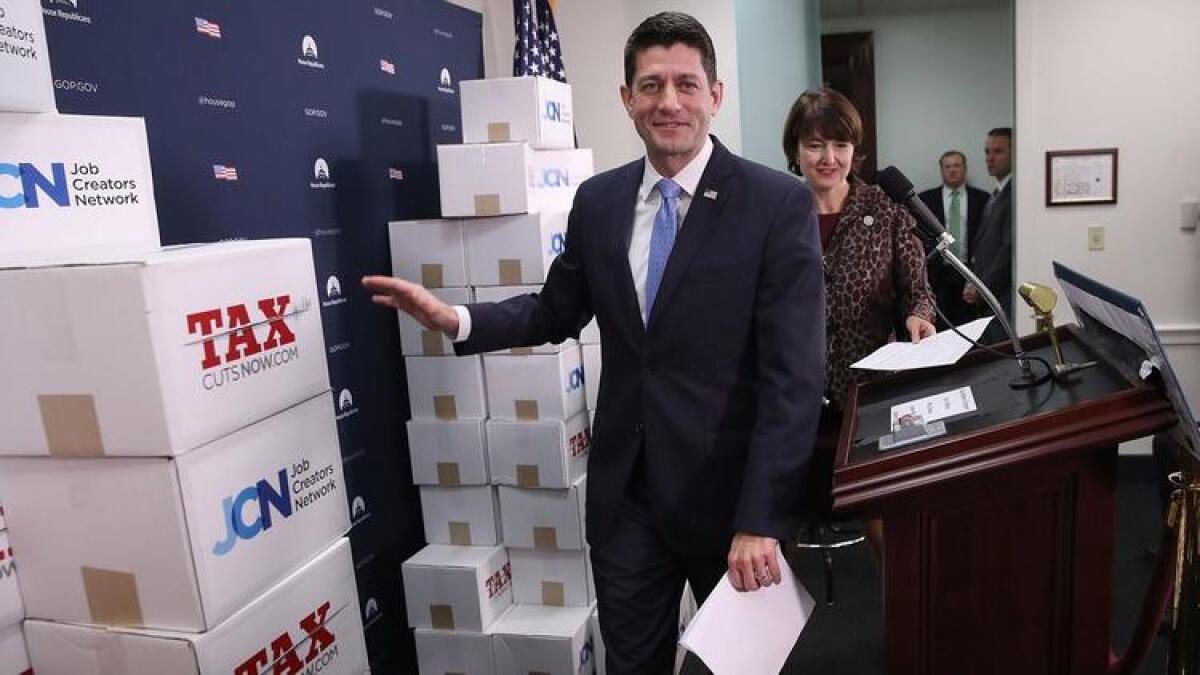
More than half of Californians oppose the GOP tax bill expected to be approved by Congress today, and just 20% believe it will have a positive affect on their families, according to a poll released Monday.
Just over half of California voters, 51%, oppose the tax bill, and 30% support it, according to the newest IGS Poll, a survey by the Institute of Governmental Studies at UC Berkeley.
And the belief falls largely along party lines, with Democrats opposing the bill by a more than 4-to-1 (67% to 15%) margin and Republicans supporting it 3 to 1 (60% to 21%).
The House and Senate are expected to vote on the tax bill Tuesday. California’s Republican members of Congress largely support the bill despite some concerns about how cuts to the state and local tax deduction and mortgage interest deduction might affect Californians. Democrats in the delegation oppose it and have said they will use the vote against vulnerable Republicans in the 2018 midterm elections.
When asked about the impact they think the bill will have on themselves and their families, just 20% of the poll’s respondents said they think it will benefit them directly, while 40% foresee a negative impact. About 27% do not expect much of an impact, and 13% said they don’t know if they’ll be affected.
The poll of a random sample of 1,000 registered voters was completed by telephone in English and Spanish from Dec. 7 to 16.
- Share via
A quick look at some of the biggest tax changes for Californians
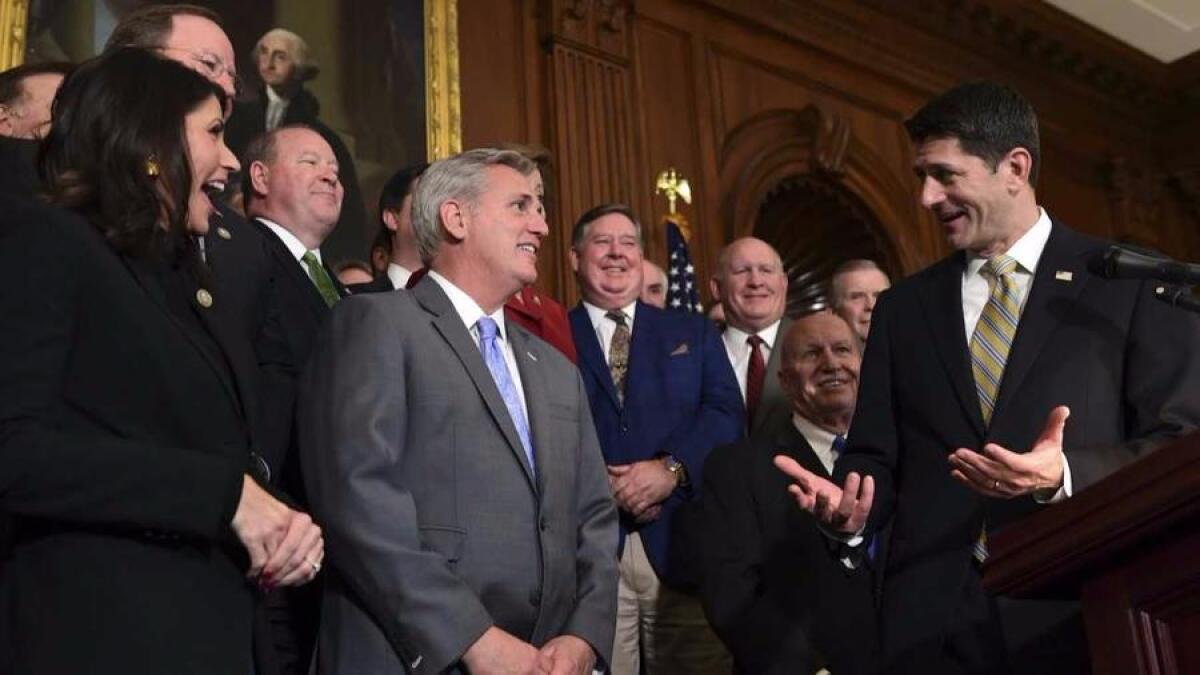
Congressional Republicans are framing their tax cut bill as a Christmas gift that will give Americans an average tax cut of $2,059. For Californians, especially in the wealthier areas along the coast, the situation isn’t as clear-cut.
When the measure comes up for a vote in the House on Tuesday morning, it’s expected to pass along party lines. At least two Republicans say they will join Democrats in the California delegation to oppose the plan because they fear it will hurt their constituents’ bottom line.
Take a quick look at what some of the biggest changes in the tax bill might mean for average Californians.
- Share via
Lawmakers, pot growers say California’s marijuana cultivation rules favor big corporate farms
California’s new rules allowing marijuana cultivation favor large corporate farms despite a promise in Proposition 64 that small growers would be protected, according to a group of state lawmakers and marijuana industry leaders who called Monday for the policy to be changed.
The California Department of Food and Agriculture issued emergency rules last month that allow for small and medium-sized farms of up to a quarter acre and one acre, respectively, to get licenses for the first five years. That five-year head start for small farms was promised in Proposition 64, the initiative approved last year by voters that legalized growing and selling marijuana for recreational use.
Individuals and businesses can get only one license for a medium-sized farm, but the new rules do not set a limit on how many small-farm licenses can be obtained by one person or business.
That could allow a corporation to assemble a 20-acre farm by obtaining 80 licenses for a quarter-acre each, opponents worry.
Democratic state Sens. Scott Wiener of San Francisco and Mike McGuire of Healdsburg, Assemblyman Jim Wood (D-Healdsburg) and the California Growers Assn. asked for swift action by the state agricultural department to change the rule.
“This is clearly a broken promise,” McGuire said. “For two years, every discussion has included a cap on cannabis grows and the Department of Food and Agriculture needs to fix this massive loophole they have created. This last-minute revision rolls out the red carpet for large corporations to crush the livelihood of small family farmers.”
With cultivation licenses set to take effect next month, the lawmakers also promised legislative hearings on why the rules were drafted to disadvantage small, mom-and-pop farms.
“California only has one chance to get this right, and it is already on the wrong path with this last-minute change that flies in the face of what the backers of Prop. 64 promised,” said Hezekiah Allen, executive director of the California Growers Assn. “This single decision will hand over the California marketplace to multinational corporations and a wealthy few at the expense of thousands of growers who are ready to play by the rules and provide economic opportunity in communities that until recently were criminalized or — at the very least — marginalized.”
The industry estimates there are about 3,500 independent growers on track to get a state license in the first half of 2018. Allen’s group estimates that number could grow to as many as 10,000 or 15,000 by the end of 2020, but not if large corporate farms are allowed in early.
The agricultural agency issued a response later: “A one-acre canopy limit has not been in proposed regulations at any point and was not included in the emergency regulations due to the fact that Proposition 64, the law guiding the process, did not provide authority to include it. However, local jurisdictions may impose that limitation on their own if it meets the needs of their constituents.”
Updated at 5:10 pm to include comment from agricultural agency.
- Share via
Gov. Jerry Brown takes to social media to criticize Republican ‘tax monstrosity’
- Share via
Rep. Grace Napolitano’s husband, Frank Napolitano, dies after battle with cancer
Rep. Grace Napolitano’s husband, Frank Napolitano, died Friday at their home in Norwalk after a battle with cancer.
The former restaurateur was 90, and had undergone chemotherapy and radiation to treat esophageal cancer over the summer.
“The congresswoman loved Frank dearly and is immensely saddened by his passing. He was a devoted husband, father, grandfather, and great-grandfather,” her office said in a statement.
The couple was married in the early 1980s after the death of Napolitano’s first husband, with whom she had five children.
The congresswoman, a Democrat, will return to Washington for this week’s vote on a tax code overhaul.
She said in April that she planned to seek reelection next year, though her husband’s health problems prompted The Times to keep the congresswoman on its retirement watch list.
- Share via
Final tax bill dramatically softens blow to mortgage interest deductions in California
Last-minute changes to the Republican-led tax overhaul seem to be tailor-made to entice support from California GOP lawmakers, several of whom voted against a previous version passed in the House last month.
The House version, passed with the support of all but three California Republicans, had proposed capping the mortgage interest deduction at loans of $500,000 or less. Republicans in high-tax, expensive states had voiced concerns the bill would have major effects in their districts.
But the final version of the bill dramatically slashed the percentage of new mortgages that would be affected if the package becomes law.
*New mortgages over $500,000 include data through Sept. 2017. New mortgages over $750,000 include data through Oct. 2017.
Source: Times analysis of data provided by CoreLogic
The particulars of the mortgage interest provision and other popular deductions were major sticking points as House and Senate negotiators hammered out a compromise between the two versions.
A previous Times analysis showed that more than half of new mortgages this year in Rep. Dana Rohrabacher’s coastal Orange County district exceeded the $500,000 cap laid out in the House version. Text of the new bill released Friday outlined a cap of $750,000, which would apply to just under a quarter of new mortgages there through October 2017. Rohrabacher was one of three California Republicans, along with Reps. Darrell Issa (R-Vista) and Tom McClintock (R-Elk Grove) who previously voted against the measure.
Rep. Mimi Walters (R-Irvine) said she supported the House version after receiving assurances from leaders that the bill would be changed to account for the loss of deductions, The percentage of new mortgages over the cap dropped from 48% to 14%.
Rep. David Valadao (R-Hanford), whose district had 1% of mortgages exceeding the $500,000 cap proposed previously, saw that share drop almost to zero; 27 of 7,515 mortgages in his congressional district this year have been for more than $750,000.
The House is expected to vote on the final tax bill Tuesday.
- Share via
California Politics Podcast: The state Senate hires new help for sexual misconduct investigations
Leaders of the California Senate have taken the first big step in changing the way sexual misconduct investigations are handled, though few would argue the real work has yet to begin.
On this week’s California Politics Podcast episode, we discuss the decision to hire two outside law firms to handle all investigations involving staffers or members of the Senate — a decision that some of the women demanding change says still needs to lead to a single new policy embraced by both houses of the Legislature.
We also discuss the legacy of San Francisco Mayor Ed Lee, whose death last week marks the end of an important era in the city. It also means new statewide attention for the woman who’s now stepped into his role.
- Share via
A major change to Proposition 13 takes its first step toward the 2018 ballot

Proponents of making a dramatic change to California’s landmark Proposition 13 property tax restrictions took their first step to getting a measure on the November 2018 statewide ballot Friday.
The change would allow the state to receive more tax dollars from commercial and industrial properties by assessing them at their current market value, an effort known as “split roll” because existing tax protections on homes would remain in place.
Advocates of the measure, including the League of Women Voters of California and community organizing nonprofits California Calls and PICO Network said the change could raise billions of dollars that could be spent on public schools and community colleges.
“I think the cumulative effects of the unfair tax system have gotten to the point where it’s created crippling economic impacts on the state,” said Melissa Breach, executive director of the League of Women Voters of California.
Backers filed their proposed initiative Friday. The attorney general’s office will prepare an official title and summary for the measure and it will receive a financial analysis. From there, advocates will decide if they will collect signatures to put the measure on the ballot.
Proposition 13 passed in 1978 amid concerns that rising property taxes could force people out of their homes. The ballot measure limited property taxes to 1% of a property’s value at the time of purchase and ensures that the assessed value on which taxes are based can only increase by a maximum of 2% a year — no matter how much a property’s market value goes up.
Split-roll measures have been long debated in state politics, but business groups and anti-tax groups have expressed substantial opposition to the idea, arguing that it would cause major harm to the state’s business climate.
Breach said she expected “an avalanche of big money” against the measure should it go forward, but said that her organization wouldn’t get involved without believing it could raise sufficient funding.S
For the record
1 p.m., Dec. 18: An earlier version of this post said the “split roll” ballot measure would allow California to charge higher tax rates on commercial and industrial properties. It would allow the state to assess those properties at current market value, not charge higher rates.
- Share via
Three more women accuse California assemblyman of sexual misconduct
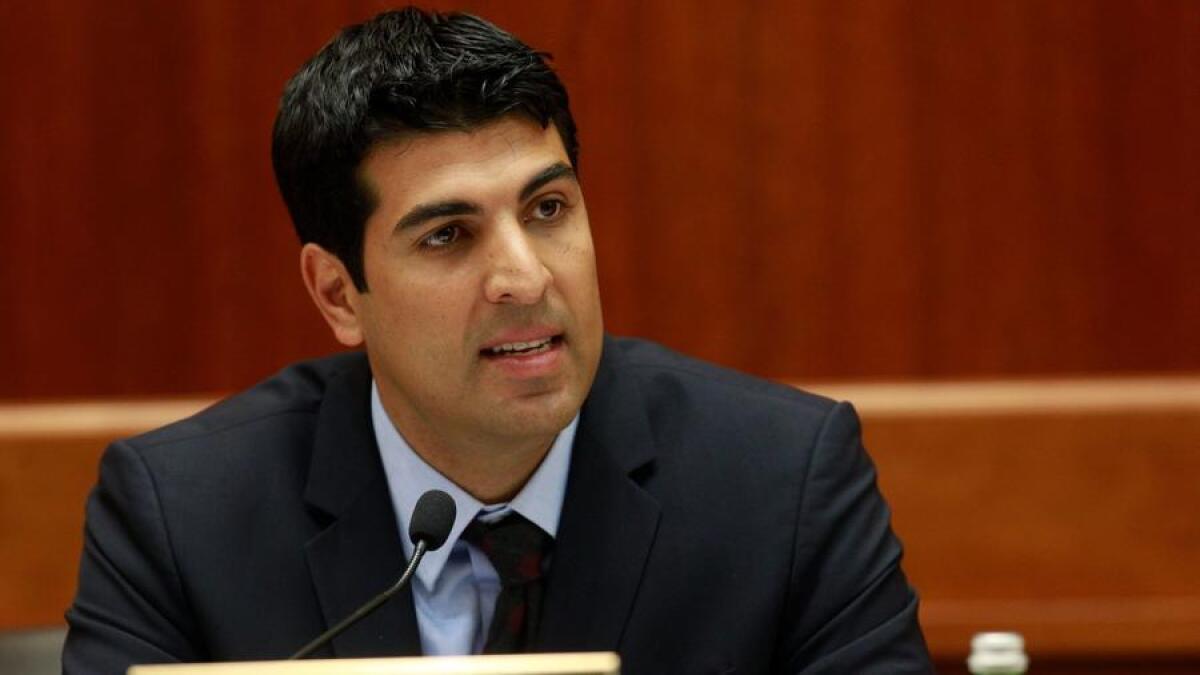
A Los Angeles woman has filed a police report alleging Democratic Assemblyman Matt Dababneh had sex with her without consent four years ago, adding new allegations of sexual misconduct to those that led the politician to announce his resignation last week. He says her claims are false.
Nancy Miret, 26, told The Times that when she was 22 and a recent college graduate, she spent time with Dababneh over two months in late 2013, primarily at his Encino apartment.
At the time, Dababneh was running for Assembly to represent the western San Fernando Valley. They had consensual sex on one occasion, but after that, Miret said she had multiple nonconsensual sexual encounters with Dababneh that left her traumatized. Miret, who now works in commercial real estate, is one of three women interviewed by The Times who have made new allegations concerning Dababneh’s behavior.
“These allegations are false and I’m confident that when all the facts are in, it will clearly show that these claims are not true,” Dababneh told The Times.
- Share via
San Diego business is first in California to be issued license to sell marijuana for recreational use
A San Diego medical marijuana business is the first firm to be issued a license by the state of California to sell marijuana for recreational use, officials said Thursday.
Torrey Holistics received two of the first 20 licenses granted by the state Bureau of Cannabis Control this week to sell or distribute marijuana, although the licenses do not take effect until Jan. 1, according to bureau chief Lori Ajax.
An additional 180 firms have applied for licenses but they are being processed.
“Last week, we officially launched our online licensing system, and today we’re pleased to issue the first group of temporary licenses to cannabis businesses that fall under the Bureau’s jurisdiction,” Ajax said in a statement. “We plan to issue many more before January 1.”
The bureau is issuing temporary, four-month licenses to firms initially, but will eventually require firms to undergo background checks and pay a $1,000 application fee for yearlong permits.
Tony Hall left a chemical distribution business two years ago to start Torrey Holistics with a friend and classmate at San Diego State. He said he was ecstatic to have the first recreational permit in California. He also obtained a new license to continue selling marijuana for medical uses.
“We feel fricking great about it,” he said Thursday. “It’s just exciting. This is a once in a multi-generational event,” he added, likening it to the end of prohibition.
Added Ruthie Edelson, the firm’s marketing director, “We will be open at 7 a.m. on Jan. 1.”
Last year, voters approved Proposition 64, which makes California one of eight states that allow the growing and sale of marijuana for recreational uses.
- Share via
Conservative activist group files a lawsuit over Los Angeles County ‘inactive voter’ list
A Washington-based conservative-leaning activist group filed a federal lawsuit Wednesday alleging Los Angeles County officials are “refusing to cancel the registrations” of voters who are ineligible to cast a ballot.
The legal action by Judicial Watch comes four months after the organization first accused elections officials across the state of maintaining registration lists that are larger than their voting-age population. The lawsuit also names Secretary of State Alex Padilla as a defendant and alleges the voter lists violate the National Voter Registration Act, or NVRA.
“They don’t care about removing ineligible registration,” said Robert Popper of Judicial Watch. “I think we have a very strong lawsuit.”
The lawsuit names four Los Angeles County voters as co-plaintiffs and asserts that a county’s two lists of voters — the file of active voters and those whose registration has been placed on “inactive” status — should be combined into a single total.
The inactive list includes people who haven’t cast ballots in recent elections and haven’t responded to inquiries from elections officials. Though the names on that list are considered voters, they are not counted in official registration reports and are not mailed election material.
Popper led an effort earlier this year to estimate the size of each county’s voting-age population using the Census Bureau’s American Community Survey. He said the survey’s five-year average of county populations was then adjusted by focusing just on the estimate of those over the age of 18, and then comparing that with the combined active and inactive voter lists.
Popper dismissed any concern that the resulting number might be skewed by the different standards used by counties for the inactive list, which could include names of voters who moved or died and thus be an imperfect guide.
“I believe that a court is going to accept our numbers,” he said.
Dean Logan, the registrar of voters in Los Angeles County, said his staff’s practices are consistent with federal law. “This lawsuit appears to fundamentally interpret the requirements of the NVRA in a manner inconsistent with ensuring voter enfranchisement and appropriate list maintenance,” he said.
The lawsuit also alleges that Los Angeles elections officials failed to provide Judicial Watch with requested data about the size of the inactive list, and accuses Padilla of failing to address the group’s concerns about California not following NVRA rules.
In a statement on Thursday, Padilla said county inactive-voter files are not out of compliance with the law. He criticized Judicial Watch for its “baseless assertions, bad math, and flawed methodology.”
Local elections officials have said very few “inactive” voters show up on election day, and that any who do would be asked to cast a provisional ballot — one that isn’t counted unless the voter’s eligibility is confirmed through additional review. Popper insisted that if the list is never used, there’s no reason to keep it.
Judicial Watch, which sued for access to Hillary Clinton’s emails in 2016, alleged that its calculations show 11 California counties with questionable voter registration totals.
- Share via
Voters in California GOP districts may get calls asking them to thank their member of Congress for tax plan
Voters in four key Republican-held congressional districts could get a robocall starting Friday urging them to call and thank their member of Congress for supporting the tax bill.
It’s a last minute effort by American Action Network, a politically active nonprofit connected with House Speaker Paul D. Ryan (R-Wis.) that has spent millions to shore up Republican support for the bill. The robocalls include the member’s office number.
The four California members being targeted are Reps. Jeff Denham of Turlock, David Valadao of Hanford, Steve Knight of Palmdale and Mimi Walters of Irvine. All four represent districts that backed Hillary Clinton for president in 2016 and are Democratic targets in 2018.
Knight and Walters had been particularly vocal about their concerns with the plan, saying it might raise taxes for their constituents. The final text of the bill is set to be released Friday, with a vote expected early next week.
In total, American Action Network plans to place 1 million robocalls in 29 districts nationwide.
- Share via
‘Merry Christmas Republicans in Congress’: Funny or Die video goes after California lawmakers over DACA
As members of Congress try to pass a controversial tax bill and a measure to keep the federal government funded, the political arm of the Congressional Hispanic Caucus is hitting Republicans hard over another unresolved issue: the legal status of hundreds of thousands of people brought to the country illegally as children who could face deportation if lawmakers don’t act.
Amid negotiations over a long-term spending bill, Democratic leaders have been pushing their GOP colleagues to include a fix for those who were granted temporary protection under President Obama’s Deferred Action for Childhood Arrivals, known as DACA. President Trump announced an end to the program earlier this year and gave Congress a March deadline to address it.
Funny or Die and BOLD PAC released a video Friday featuring comedians skewering GOP members, including two in California, for their inaction.
In the video, Oscar Nuñez, best known for his role on “The Office,” calls out Reps. Steve Knight (Palmdale), Ed Royce (Fullerton), Carlos Curbelo (Florida) and John Culberson (Texas), who “get to go ahead and celebrate as thousands of Dreamers are banished from the only country they’ve ever called home.”
“How many broken promises can fit in a stocking?” Nuñez asks later. “I’m asking for a congressman.”
The political action committee says it’s spending six figures on the weeklong buy, which will go out nationwide across Funny Or Die’s social media channels. They are known for blasting out irreverent, often viral parodies that play to young audiences.
The video will also be targeted to constituents in each of the four congressional districts. A separate video released by the ACLU last week also urged members of Congress to strike a deal on DACA.
Many California Republicans have remained mum on the issue, particularly those facing tough races in 2018. So far, only Reps. David Valadao (Hanford), Jeff Denham (Turlock) and Mimi Walters (Irvine) have pressured fellow Republicans to come up with a solution before Congress breaks for Christmas.
Following Trump’s decision, Knight said the issue should “receive attention by Congress.” Royce, who has taken hard-line stances on immigration in the past, urged his colleagues to provide a “permanent, legislative solution that gives certainty to these kids.” Neither elaborated on what that solution should be.
- Share via
For a prominent California consumer group and savvy political consultants, documents reveal a close financial relationship
If there’s a clear mantra for Consumer Watchdog, one of California’s most visible and vocal advocacy groups, it’s that hidden financial relationships shouldn’t shape politics and public policy.
The Santa Monica-based nonprofit has spent more than three decades reprimanding politicians and interest groups for doing the bidding of those who give them money. Its official motto is “expose, confront, change.”
“We are loud, and we speak more of a populist truth than the way people usually talk to each other in Sacramento,” said Jamie Court, Consumer Watchdog’s president.
- Share via
Regional director resigns from California Democratic Party amid sexual misconduct claims
A regional director with the California Democratic Party submitted his resignation on Thursday, nearly two weeks after a 23-year-old woman reported that he sexually assaulted her last year, spurring party leaders to seek his ouster.
Craig Cheslog served as Region 2 director spanning the East Bay, Napa, Sonoma and the Clearlake areas. In a statement, his lawyer, Mary P. Carey, said she and her client were “confident that a full and fair exploration of this matter, undertaken in an appropriate, fact-governed venue, would exonerate Mr. Cheslog.”
“We are prepared, if necessary, to put forward the facts of this matter in just such a venue,” she said.
Democratic Party Chairman Eric Bauman and other officials initially called for Cheslog’s removal in a Nov. 29 letter to state party secretary Jenny Bach. They said he was seen acting “in an inappropriate and sexually aggressive manner” toward a member of the party in a public area of the Westin San Francisco Airport Hotel, following a Nov. 18 executive board meeting.
“The level to which this activity advanced made a number of those in attendance uncomfortable,” the letter stated. It added that another member reported “that Mr. Cheslog raped her at a CDP executive board meeting the previous year.”
Party officers said the incident occurred during a weekend where the prevention of sexual harassment of women in politics was a dominant theme in the wake of the #metoo movement. Before the meeting’s conclusion on Sunday, the California Women’s Caucus approved a resolution making clear that sexual harassment, bullying and other forms of abuse are grounds to lose endorsements and be stripped of party membership.
Maddy Dean, who was not named in the letter, spoke at the meeting about her experiences of sexual harassment in the movie industry, and told the Times that she reported Cheslog. She said she could not provide further details about her allegation as she explores possible legal paths moving forward.
“This was about protecting other women and in particular other young women,” she said of reporting the assault.
In his own letter to Bach on Thursday, Cheslog did not acknowledge any wrongdoing. He said he was stepping down to prevent any personal misconduct allegations “from creating a distraction with the party at a critical moment in national and state politics.”
“I am confident of the results that would be forthcoming in a fair, fact-based exploration of this matter,” he said.
Since the report, Cheslog has been fired from his job at Common Sense Media, a nonprofit organization that helps families navigate media and technology. He also has stepped down from his position on the Acalanes Union High School District Board of Trustees.
“The conduct represented a serious violation of both company policy and the way in which our employees are expected to conduct themselves in the community at large,” Common Sense spokeswoman Corbie Kiernan said in a statement. “We immediately suspended Mr. Cheslog and conducted an investigation. As a result of the investigation, Mr. Cheslog’s employment with Common Sense was terminated.”
4:05 p.m.: This post was updated with Cheslog’s resignation from the school board.
- Share via
Sen. Bob Hertzberg will cooperate with investigation into unwanted hugs
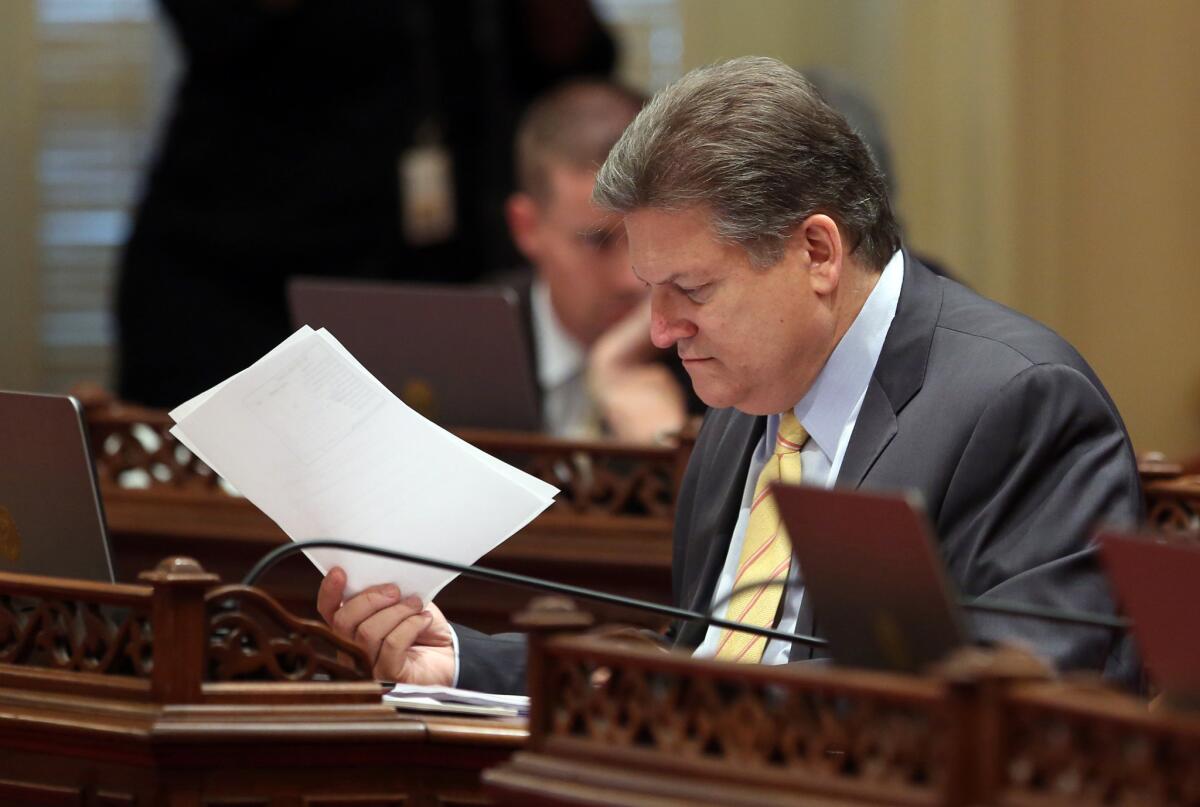
State Sen. Bob Hertzberg (D-Los Angeles) said Thursday he will cooperate with a state investigation into complaints from a former legislator that she was uncomfortable with his repeated hugs after she asked him not to touch her.
Senate President Pro Tem Kevin de León said Thursday that a team of outside attorneys will investigate a complaint by former Assemblywoman Linda Halderman that Hertzberg has made her uncomfortable with hugs that were too close and lasted too long.
Hertzberg, well-known for hugging other lawmakers, said he supports having any allegations investigated by the two outside law firms.
“I just learned of the investigation, and will fully cooperate,” he said. “The use of an independent third party investigator is essential to improving transparency and trust in the system.”
Halderman said Thursday she was encouraged that her concerns will be investigated, but said it was “disturbing “ that attorneys for one of the law firms selected, Gibson, Dunn and Crutcher, contributed more than $90,000 in campaign funds to sitting legislators including Hertzberg.
Halderman, a surgeon, served in the state Assembly from 2010 through 2012 and said Hertzberg hugged her multiple times even after she asked him to stop because she was uncomfortable. The last incident occurred in a hallway of the Capitol, she claimed.
“I told him I don’t care to be hugged. ‘Don’t touch me,’ ” Halderman recalled. “He then grabbed me and pinned my arms to my side and used his hands to press my lower back into his groin and he essentially pinned me so I couldn’t push off of him to get away the way I ended previous hugs.”
“It was certainly so over the line,” she added.
Halderman said a current female senator and assemblywoman also have complained about inappropriate hugs from Hertzberg.
However,
Sen. Cathleen Galgiani (D-Stockton) defended Hertzberg, saying she has known him for many years and he has always acted as a “gentleman.”
“I have never felt uncomfortable with him, and have always felt his hugs were a display of affection - which I appreciate,” she said. “I consider him a dear friend.”
Updated at 5:30 pm to include comment from Sen. Galgiani.
- Share via
California regulators sign off on the state’s ambitious 2030 climate change plan
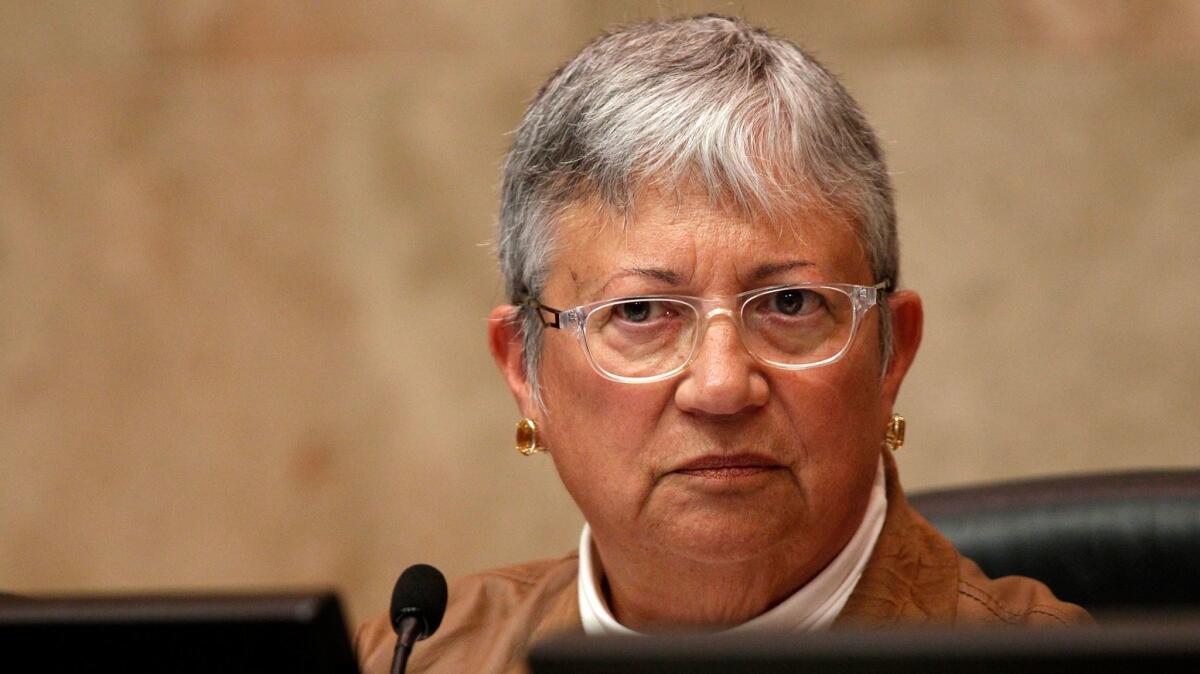
California climate regulators on Thursday approved a detailed plan for the state to meet its 2030 carbon reduction goals.
The effort, known formally as the “scoping plan,” details the state’s strategies for reducing greenhouse gas emissions 40% below 1990 levels over the next 13 years as a way to fight climate change.
Mary Nichols, chairwoman of the California Air Resources Board, called the plan “a visionary look at the longer term and deeper kinds of transformations that we’ll need to stabilize our climate.”
“This is a major step forward,” she said.
To meet the 2030 goals, which were approved by the state Legislature in 2016, regulators plan to rely on implementing goals set in other recently passed legislation, including:
- Generating half the state’s electricity from renewable sources by 2030.
- Cutting methane and other highly polluting emissions.
- Improving air quality.
- Reducing the amount of carbon in gasoline.
- Increasing the sustainability of trucks and other heavy-duty vehicles.
- Boosting housing development near job centers and transit to reduce driving.
- Continuing cap and trade, the market-based program requiring polluters to pay for their emissions.
- Share via
Rep. Maxine Waters asks Justice Department to investigate fake letter tweeted by Republican opponent

Rep. Maxine Waters is asking the Justice Department to look into a fake letter posted to Twitter by her Republican challenger that falsely indicated the congresswoman wants to resettle tens of thousand of refugees in her Los Angeles district.
The GOP candidate, Omar Navarro, posted the letter on what looks like official House of Representatives letterhead to Twitter on Monday. The letter, which purports to be from the congresswoman, says the congresswoman wants to bring refugees to her congressional district after the 2018 election “and perhaps even once I have secured the Speaker of the House position.”
Navarro accompanied the tweeted letter with a message: “According to this document, Maxine Waters wants more terrorists, like the one who bombed NYC, in California’s 43rd District. As Congressman of CA’s 43rd District, I will oppose such policies.”
It’s been retweeted more than 680 times. But the letter is “a forgery and a fake,” her chief of staff, Twaun Samuel, said in a news release.
The letter, dated June of this year, also contains several inaccuracies. It references multiple committees and subcommittees Waters does not serve on, and lists an address for a district office that has been closed for nearly a decade.
Waters filed a complaint about the tweeted letter with the House general counsel, who forwarded the complaint to the U.S. Attorney for the Central District of California and the fraud section of the Criminal Division for the United States Department of Justice.
The complaint states that Waters has not communicated with the letter’s purported addressee — Teri Williams, who is president and chief operating officer of the Los Angeles-based OneUnited Bank, about any refugee resettlement program.
Impersonating a federal official and misusing a federal seal are federal crimes.
Navarro, who is backed by big name far-right conservatives, said Thursday that the letter was sent to his campaign through Facebook by a person he didn’t know. He said neither the Justice Department or Waters’ staff has asked him about the letter.
“I don’t know if it’s real or not, so I put it out there,” Navarro said, adding that he believed his followers would help him determine if it is real. “It doesn’t say that I know. It’s according to this document … what, am I supposed to send it to her and get an email back from Maxine?”
- Share via
Sen. Tony Mendoza refuses to take a leave of absence amid harassment probe
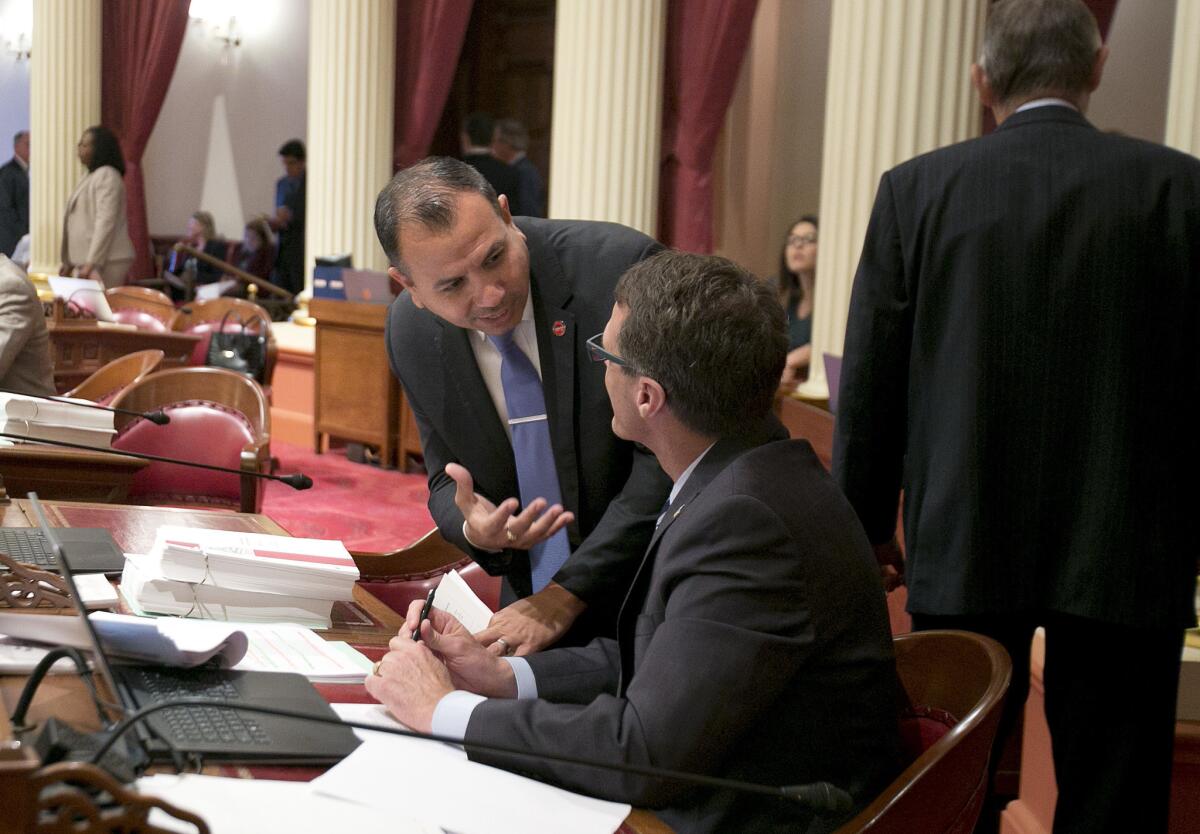
Defying pressure from legislative leadership, state Sen. Tony Mendoza (D-Artesia) refused Thursday to take a leave of absence until an investigation into sexual harassment allegations against him is concluded early next year.
Mendoza has denied allegations by former employees that he treated three female aides inappropriately, inviting them to hotel stays and asking one to visit his home to work on her resume.
“I am very disappointed that certain Senate Rules Committee members are apparently asking me to take a leave of absence or resign before any investigation has even begun and without giving me an opportunity to defend myself,” Mendoza said in a statement. “This is contrary to the very concept of due process, which is a pillar of our American system of fairness and judicial prudence. These actions bypass any process in a rush to judgment.”
Senate President Pro Tem Kevin de León (D-Los Angeles) earlier Thursday called on Mendoza to take a leave of absence.
Mendoza had previously been stripped of his leadership positions, including chairmanship of the Senate’s committee on banking and insurance.
Mendoza questioned statements urging him to step down, saying they leave him concerned about the fairness of the investigation. He also said he has been disappointed that he has been told he cannot publicly address allegations.
“I was not appointed to the position I hold, but was elected by the voters in my district,” he said. “I am grateful to the voters in my district and thank them for their trust and their continued support. The Senate owes them an opportunity to hear the truth. I assure them that I will vigorously defend myself to clear my name.”
- Share via
State Senate leader asks Sen. Tony Mendoza to take leave of absence amid sexual harassment investigation
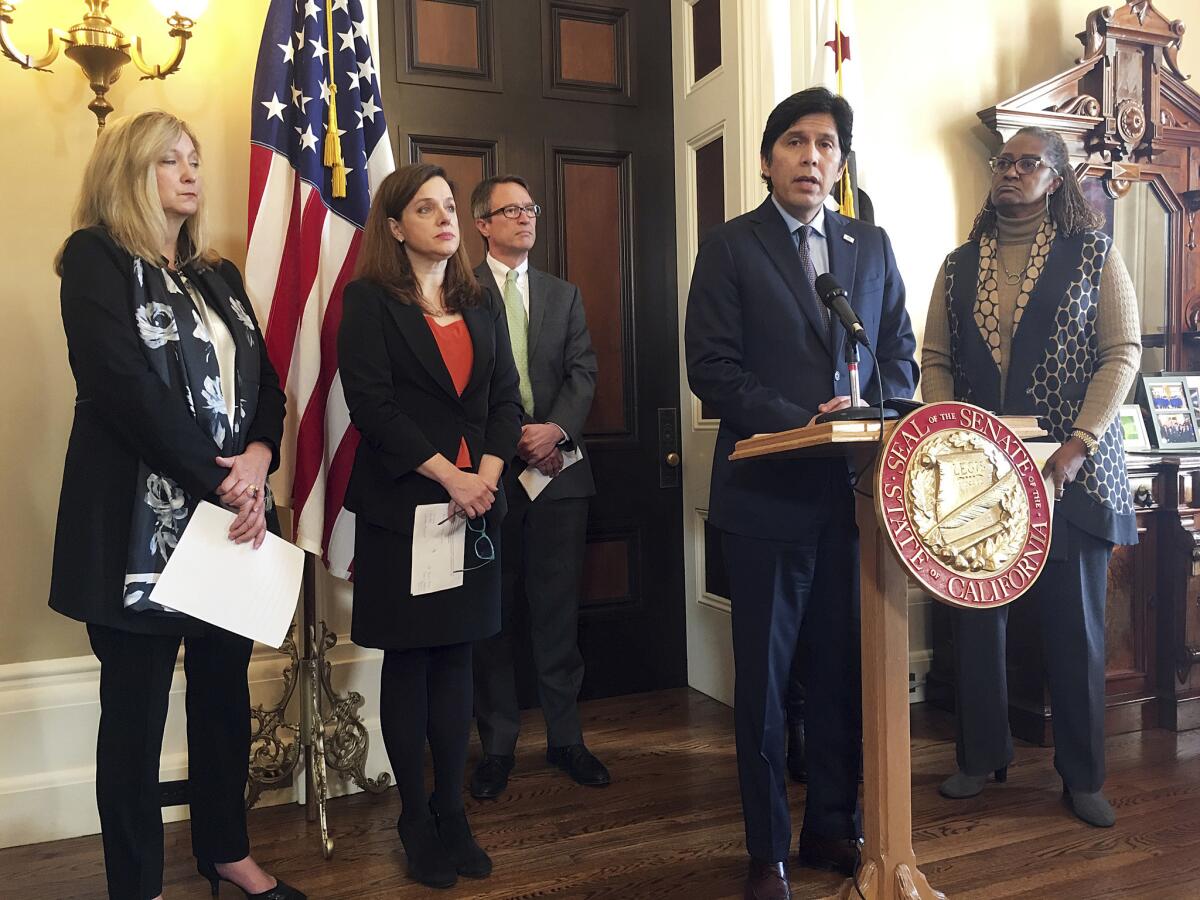
State Senate leader Kevin de León said Thursday he has “strongly suggested” that Sen. Tony Mendoza take a leave of absence until the completion of an investigation by outside attorneys into allegations that Mendoza sexually harassed three former aides.
“Given the severity of the allegations against Senator Mendoza I do not believe he can perform the duties in Sacramento right now while the investigation is being conducted,” De León told a packed news conference in his Capitol office. “I believe It’s the right thing to do, it’s the fair thing to do,” to take a leave, he said.
The Senate leader also said the outside attorneys have been asked to investigate complaints by former Assemblywoman Linda Halderman that Sen. Bob Hertzberg (D-Los Angeles) inappropriately hugged her on multiple occasions in a way that made her uncomfortable, even after she asked him to stop.
De León also announced the hiring of two law firms to handle the Mendoza and Hertzberg investigations, and all future probes of harassment and abuse involving Senate employees.
Mendoza, a Democrat from Artesia, did not immediately respond to the request to step aside.
De León, a Democrat from Los Angeles who had been Mendoza’s roommate before the allegations were made public, said he made the suggestion to Mendoza in a meeting Thursday morning.
If Mendoza refuses to take a leave, the Senate has the power to suspend him without pay, but De León said that is not currently under discussion. There is an effort underway to force his expulsion in January when the Legislature returns to Sacramento.
Former Mendoza employees have claimed that he gave inappropriate attention to a female fellow and intern, inviting one to his home and hotel and giving the other alcohol in a hotel even though she was underage. Another former female aide told the Sacramento Bee that Mendoza invited her to one-on-one dinners and a weekend at Pebble Beach.
Mendoza has denied the allegations.
The Gibson, Dunn and Crutcher and Van Dermyden Maddux law firms have been retained for two years, according to Sen. Holly Mitchell (D-Los Angeles), who participated in their selection.
Have you experienced sexual harassment in government or politics? Tell us your story » »
In addition, the state is contracting with Weave, a Sacramento crisis-intervention organization for survivors of domestic violence and sexual assault, to provide counseling and to establish a hotline for Senate employees who are victims of sexual assault. The hotline number is 1-800-729-1443.
“America is finally reckoning with entrenched inequities in our personal and professional relationships and in workplaces of every type,” De León said. “Nowhere is this reckoning more important than in the halls of power — our political institutions.”
- Share via
Watch live: California Senate leader addresses sexual misconduct at state Capitol
- Share via
California state senator pledges to bring back net neutrality rules just as FCC votes to repeal them

Moments after the Federal Communications Commission on Thursday voted to roll back net neutrality regulations, a state senator pledged to introduce legislation that would preserve open internet protections for consumers in California.
“Net neutrality is essential to our 21st century democracy, and we need to be sure that people can access websites and information freely and fairly,” Sen. Scott Wiener (D-San Francisco) said in a statement. “If the FCC is going to destroy net neutrality and create a system that favors certain websites just because they can pay more money, California must step in and ensure open internet access.”
The announcement of the proposal came shortly after the FCC voted to repeal net neutrality in an expected 3-2 party-line vote, with Republicans calling for an end to the utility-like oversight of internet service providers.
The Obama-era rules put in February 2015 barred broadband and wireless companies, such at AT&T Inc., Charter Communications Inc. and Verizon Communications Inc. from selling faster delivery of certain data, slowing speeds for certain video streams and other content, and discriminating against legal material online.
Before the vote, FCC Chairman Ajit Pai argued loosening the regulations would allow the online economy to flourish. FCC commissioner Jessica Rosenworcel, one of the the two Democrats on the commission, said the rollback would inhibit the openness that has made the U.S. internet the “envy of the world.”
Supporters of net neutrality are expected to file suit to try to halt the repeal plan.
Weiner’s attempt to institute net neutrality rules in California could have challenges. The FCC order states that “allowing state and local governments to adopt their own separate requirements,” which could impose a heavier burden on companies, could disrupt the balance between state and federal regulations.
The preemption of state and local net neutrality measures is something that could be challenged in court. Amid such legal battles state legislation could face heavy lobbying efforts from internet providers arguing against uneven regulations.
A bill by Assemblyman Ed Chau (D-Monterey Park) was shelved last legislative session over similar disputes. It would have enshrined in state law other FCC regulations that were rolled back this year by President Trump and Congress. The Internet privacy rules limited what broadband providers can do with their customers’ data.
The bill’s defeat capped a behind-the-scenes battle that pitted telecom companies against state internet service providers and brought other bills to a halt in the state Senate as negotiations unfolded over legislation that would have had national significance.
UPDATES
7:57 a.m.: This post was updated with additional information about the potential legal case.
LA Times reporter Jim Puzzanghera contributed to this report.
- Share via
L.A. County sheriff’s office failed to follow policy for issuing concealed weapon permits, audit says

The Los Angeles County Sheriff’s Department has repeatedly failed to follow its own rules for issuing concealed weapon permits, the state auditor concluded in a report released Thursday.
L.A. County Sheriff Jim McDonnell disputed some of the key findings of the audit, saying state officials misinterpreted the policy.
The department policy requires applicants to provide “convincing evidence” of a “clear and present danger to life or of great bodily harm” to get a license, but the audit found the department issued 24 licenses during the last few years without sufficient evidence.
Most of the 197 active licenses in L.A. County as of August went to current or former law enforcement officers, judges and prosecutors, the audit found. The lieutenant in charge of reviewing applications told auditors that people in law enforcement satisfy the department’s requirements by the nature of their jobs.
“However, making that decision based solely on the applicant’s profession both directly contradicts Los Angeles’s written policy — which specifically states that no position or job classification in itself shall constitute good cause for issuance — and has led the department to treat applicants inequitably based on their occupations,” the audit says.
McDonnell said the audit identified some legitimate issues, and the department has added a checklist to the application process in order to show requirements have been met. But he disagreed on the report’s sweeping conclusion that the department consistently failed to follow its own policies.
“The LASD policy simply requires that the applicant provide ‘convincing evidence’” that his or her life or physical safety is threatened, the sheriff said. He said the policy does not require additional documentation of that evidence if sufficient information is provided in the application.
Auditors also concluded that Sacramento County issued some licenses without proper documentation and that San Diego County’s renewal process led it to inappropriately renew some licenses.
- Share via
State Sen. Andy Vidak drafts resolution to expel Sen. Tony Mendoza following harassment allegations
- Share via
Anti-Issa effort discloses donors: Leo DiCaprio, Jane Fonda, Ted Danson and more
A political group that has brought professional political organizers into the campaign against Rep. Darrell Issa has received its most significant contributions to date — from actress Jane Fonda and other celebrities.
Fonda gave $100,000 to Flip the 49th! Neighbors in Action, which recently registered as a political committee to get Issa, R-Vista, out of office. Comedian Bill Maher gave $15,000 to the group, a rebuke of a politician who has twice appeared on his talk show. Former California Sen. Barbara Boxer gave $2,500, as did Academy Award recipient Leonardo DiCaprio. Actor Ted Danson gave $1,500.
Flip the 49th gave the The San Diego Union-Tribune a list of donors more than a month before it’s required to disclose them to the Federal Election Commission.
- Share via
California Senate GOP leader: Release Capitol whistleblowers from non-disclosure agreements
California Senate Republican leader Patricia Bates is wading into the sexual harassment debate that has swept up the Capitol and is calling on her Democratic colleagues to allow whistleblowers to speak out by releasing them from non-disclosure agreements.
Bates (R-Laguna Niguel) wrote in a letter to the Democratic legislative leaders — Senate Pro Tem Kevin de León (D-Los Angeles) and Assembly Speaker Anthony Rendon (D-Paramount) — that Senate Republicans are calling for the Legislature to allow victims or witnesses who may have signed such agreements to share their experiences publicly.
“This release from NDAs would empower victims of sexual harassment, create a new atmosphere for resolving sexual harassment or discrimination concerns, increase public awareness and transparency, and ensure that both the Senate and the Assembly fulfill their obligations to the public and their employees for providing a safe and welcoming workplace environment,” Bates wrote in the letter, dated Dec. 12.
The Republican senator also laid out suggestions to improve the Legislature’s handling of sexual harassment complaints, such as jointly convening both houses’ rules committees — which act as the chambers’ human resources departments — to have a “comprehensive, bicameral and bipartisan review.”
Bates wrote that the Joint Rules Committee “should consider the assigning of an outside entity for assuming responsibility for all issues regarding sexual harassment.” She said the California Highway Patrol or an inspector general could serve that function.
Bates is currently serving on a panel designated by the Senate Rules Committee to select an outside law firm to investigate sexual harassment complaints.
De León, in a statement, said he agreed with Bates “that sexual harassment is a bipartisan, bicameral problem that requires bipartisan, bicameral solutions.”
“Many of these recommendations we are already pursuing and evaluating in some form and we look forward to working in collaboration with Senator Bates — as we did with the independent selection panel — on additional reforms in the weeks to come,” De León said.
With regard to non-disclosure agreements, De León spokesman Jonathan Underland said the Senate is “discussing with attorneys and anti-harassment experts about what options are available without violating the privacy rights of past victims.”
John Casey, a spokesman for Rendon, said “the Assembly does not ask for NDAs in settlement agreements.”
“The Speaker agrees with both the Legislative Women’s Caucus and the Rules Committee chair that any sexual harassment policy should be both bicameral and bipartisan,” Casey said.
- Share via
California plans to send out licenses for pot sales this month — but they won’t be effective until Jan. 1

California officials said Wednesday they plan to use email before the new year to send out some licenses to sell marijuana to speed up the transition to a regulated market. The licenses will not go into effect until Jan. 1.
Proposition 64, which legalized the sale of marijuana for recreational use, required the state to begin issuing licenses by Jan. 1. Because that date is a state holiday, the bureau originally planned to begin sending them out on Jan. 2. That has changed.
“Much of the date discussion — Jan. 1 versus Jan. 2 — was based on whether or not we’d be able to be open on a state holiday,” said Alex Traverso, a bureau spokesman. “The solution to that issue was to issue licenses with an effective date of Jan. 1 since licenses will be issued electronically. That eliminates the need to have the office open on Jan. 1.”
He said that, as of Wednesday, the bureau has not yet sent out any emails with licenses approved to begin operating Jan. 1.
- Share via
California’s budget director makes last ditch effort to urge GOP members to vote against tax plan
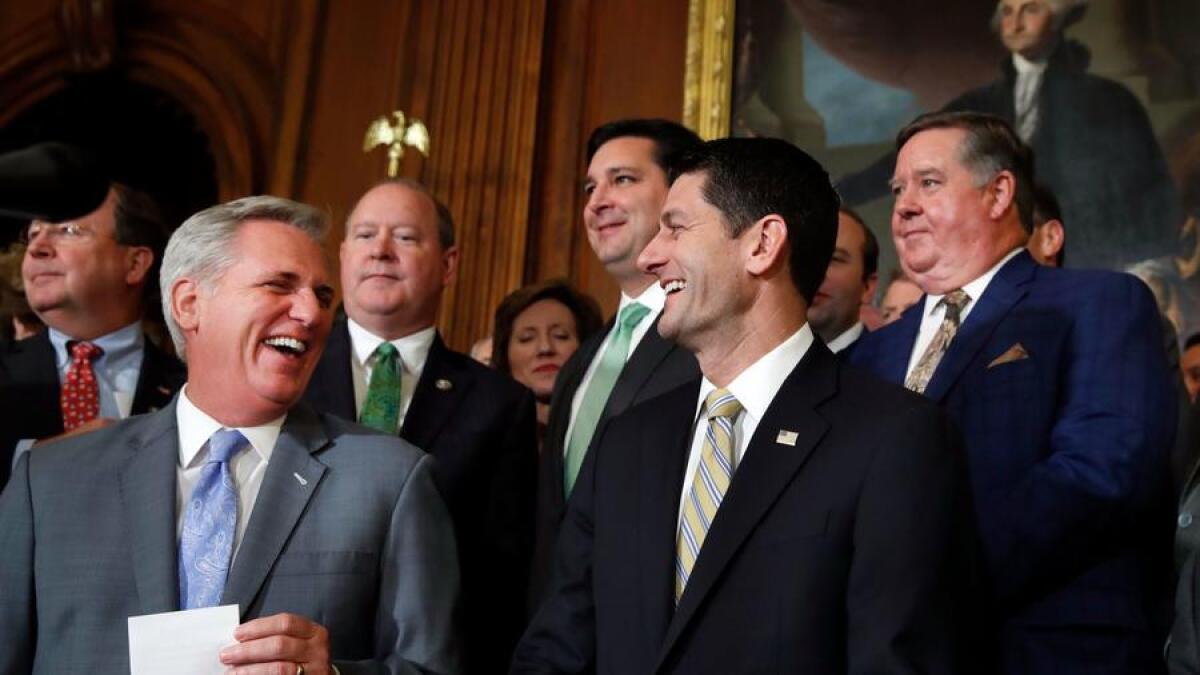
As closed-door negotiations over the final tax bill come to an end, the head of the California Department of Finance is making a last-ditch effort to convince Republicans in the state’s congressional delegation to vote against the plan.
In a letter to the entire delegation Wednesday, Finance Department Director Michael Cohen detailed 10 issues in the current tax proposals about which the state is worried.
Some of Cohen’s concerns may be addressed in the deal that House and Senate leaders said they reached Wednesday morning. Details of the agreement are not yet public.
Cohen’s concerns range from potentially billions less in federal funding available to California to offset the $1.4 trillion the plan is expected to add to the federal deficit, to the environmental effect of ending green energy tax credits.
California’s 39 Democratic representatives are expected to oppose the final tax bill, which could come before both chambers of Congress by early next week. Three California Republicans — Reps. Darrell Issa of Vista, Dana Rohrabacher of Costa Mesa and Tom McClintock of Elk Grove — voted against the original House version, and several other California Republicans have indicated they might be willing to vote against the final plan.
Cohen specifically pointed to issues that have been raised by the uncertain House members, including the proposal to lower the cap on the mortgage interest deduction, the plan to limit state and local tax deductions and the elimination of a deduction for uninsured personal property damaged in natural disasters such as fires.
- Share via
California lawmakers have fought sexual misconduct on military bases, farms and college campuses. Will they police their own house?
Over the past decade, California lawmakers have worked to help curb sexual violence in the workplace and other spheres of public life. They have pushed college campuses to keep better track of incident reports, created whistleblower protections for military officers who file claims and established sexual harassment training for farmworkers and janitors.
Now, as more than 140 women have come forward in an open letter to denounce a “pervasive” culture of sexual harassment in the California Legislature, activists and employment lawyers say lawmakers have not held colleagues and staffers to the same standards demanded of those in other fields.
“Members [of the state Assembly and Senate] are quick at pointing the finger at other folks,” said Fiona Ma, a former Democratic assemblywoman from San Francisco who is now running for state treasurer. “But they don’t want to look inside and fix their own house, air their own dark, dirty laundry.”
- Share via
California’s cap-and-trade climate program could generate more than $8 billion by 2027, report says
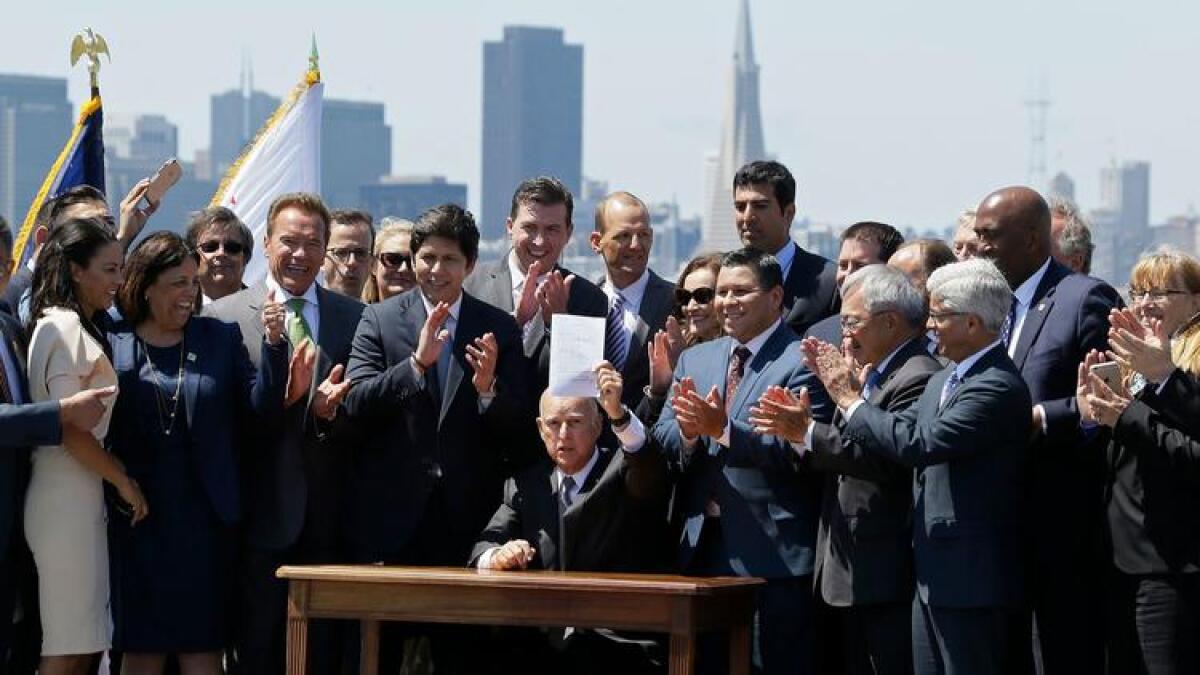
Although California’s cap-and-trade program was designed to combat climate change, a new analysis predicts it could also provide significant cash — as much as $8 billion in a decade’s time — for state and regional programs.
The report issued Tuesday by the independent Legislative Analyst’s Office projects a wide range of revenue generated by the sale of permits for companies to emit greenhouse gases beyond a state-ordered emissions cap. The most recent auction of those emission permits brought in more than $800 million.
The analysis warns that annual cap-and-trade revenue beyond 2020 is “highly uncertain,” and offers a possible range from $2 billion in 2018 to almost $7 billion in 2030 — the final year of the program under legislation Gov. Jerry Brown signed in July.
The estimate of $8.3 billion in 2027 is the high-water mark for any year in the report. Researchers cite a number of factors that make a specific prediction impossible, including future technology that allows industries to cut greenhouse gas emissions easily and thus pass on purchasing emission allowances.
“While it is clear that there will be additional revenues to the state beyond 2020, the amount that will be generated annually is highly uncertain,” the report reads.
Money collected from the sale of pollution permits is required to be spent on programs combating climate change. A portion of the money also is earmarked for the state’s high-speed rail program.
The report urges lawmakers to provide oversight for future decisions made by the California Air Resources Board, the agency that has taken the lead on climate change efforts. In particular, the analysts warn that allowing businesses to stockpile too many permits — ones bought at current low prices — could lead to excessive greenhouse gas emissions in future years, potentially even causing the state to miss its annual benchmark as soon as 2024.
- Share via
Vice President Pence meets with California lawmakers about massive fires
A handful of California representatives discussed the federal response to their state’s wildfires Tuesday with Vice President Mike Pence.
Attending the West Wing meeting were House Majority Leader Kevin McCarthy (R-Bakersfield) and Reps. Ken Calvert (R-Corona), Darrell Issa (R-Vista), Julia Brownley (D-Westlake Village), Steve Knight (R-Palmdale) and Salud Carbajal (D-Santa Barbara).
“It was a very bipartisan-spirited meeting. He clearly understood the significance of the fires and the impacts,” Brownley said after the meeting. She said Pence offered federal assistance and “recognized that recovery was going to be very important and that we want to work together to make sure that we can get the resources needed.”
President Trump signed an emergency declaration for the Southern California fires last week. Pence visited California this fall to view fire damage in Northern California.
“He stayed engaged and specifically wanted to make sure that FEMA and the other organizations were continuing to meet or exceed all expectations,” Issa said after the meeting. “We mostly thanked him for the fact that he’s taken a personal interest and his team has been at the heart of the domestic coordination.”
There was no discussion about reinstating a federal tax deduction for uninsured damage repairs that would end up in the House and Senate tax bills, Brownley said.
“If you can’t deduct uninsured property loss, it’s devastating. It would be devastating,” Brownley said.
- Share via
Rep. Issa joins California cities in urging Congress to keep state and local tax deduction
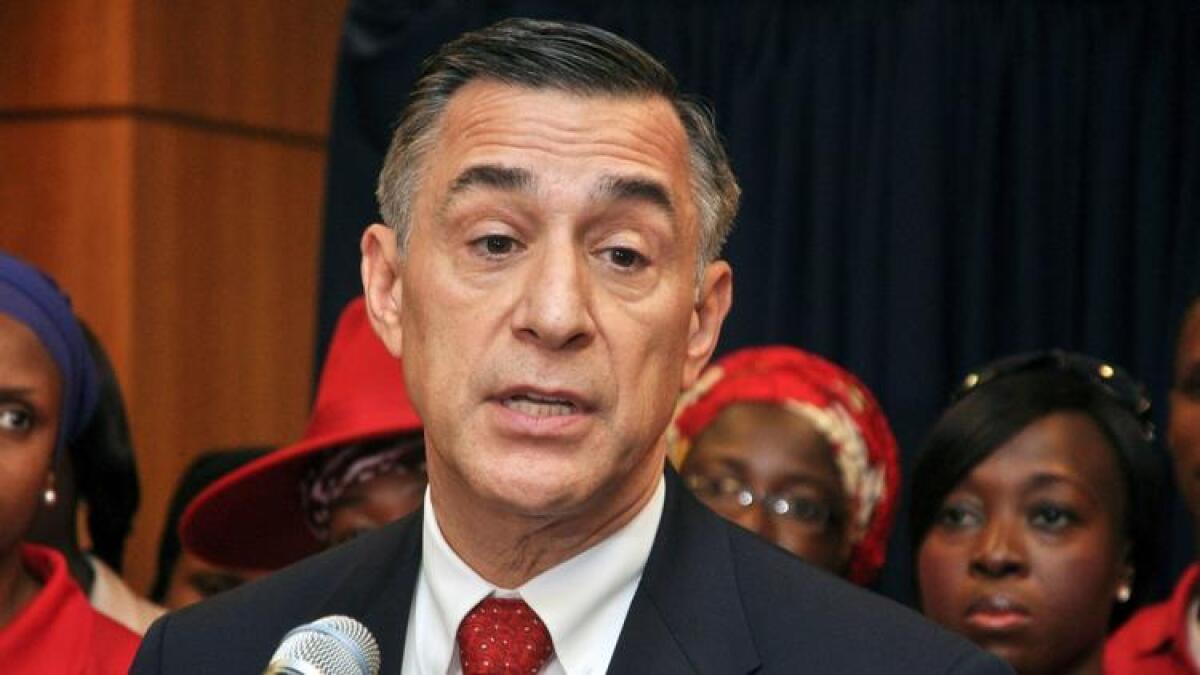
As the House and Senate work to reconcile their versions of the tax bill, Rep. Darrell Issa (R-Alpine) is urging negotiators to let Americans continue to deduct their state and local taxes on their federal income tax returns. He also is asking for a fix to continue a credit for post-disaster rebuilding costs.
In a letter Tuesday to House and Senate leadership and the members tasked with melding the two bills together, Issa emphasized that the final bill should not pick winners and losers.
“We have a once-in-a-generation opportunity to deliver real reprieve from years of heavy-handed, misguided tax policy that has left millions paying more to their government and getting less in return. We must not squander this moment by passing a bill that does not allow all hard-working taxpayers to see relief,” Issa said.
Issa included letters calling for the deduction to be preserved from cities in his district as well as from hundreds of city officials through the League of California Cities.
“California cities cannot afford the current versions of the Tax Cuts and Jobs Act (HR 1) passed by both chambers,” the League’s letter states.
Issa was among just three GOP California House members who voted no on the House version of the bill, saying that ending or limiting the salt and local tax deduction would result in a tax increase for people in his Orange County and San Diego County district. He’s since said the version that came out of the Senate was not an improvement and that Californians shouldn’t be taxed twice on the same money.
“Yes, the tax factory known as the California State Legislature is the root cause of the problem. But my constituents did not ask me — or any Republican for that matter — to vote to make their tax burden even worse,” Issa said.
Several California Republicans are supporting a moderated version of the popular tax deduction in the final tax bill, with a potential $10,000 cap to the total annual deduction. That’s half of what most Californians who take the deduction usually claim, on average.
- Share via
Duncan Hunter challenger drops his campaign, endorses Democratic opponent
- Share via
‘We must talk about the health aspects’ of climate change, Schwarzenegger says in Paris

He showed up at Paris City Hall on Monday on a green bicycle and wearing a green tie to talk climate change with the mayor.
But Arnold Schwarzenegger almost didn’t make the trip from Los Angeles. One of the wildfires scorching Southern California was threatening his home.
“Luckily we have extraordinary firefighters,” he told a group of officials and journalists.
The actor and former governor of California was speaking in Paris as the founder of R20, a nonprofit based in Geneva that aims to help regional, state and local governments reduce their carbon emissions by developing clean energy sources.
- Share via
A special recall election for state Sen. Josh Newman would cost a lot more than waiting for the June primary, state says
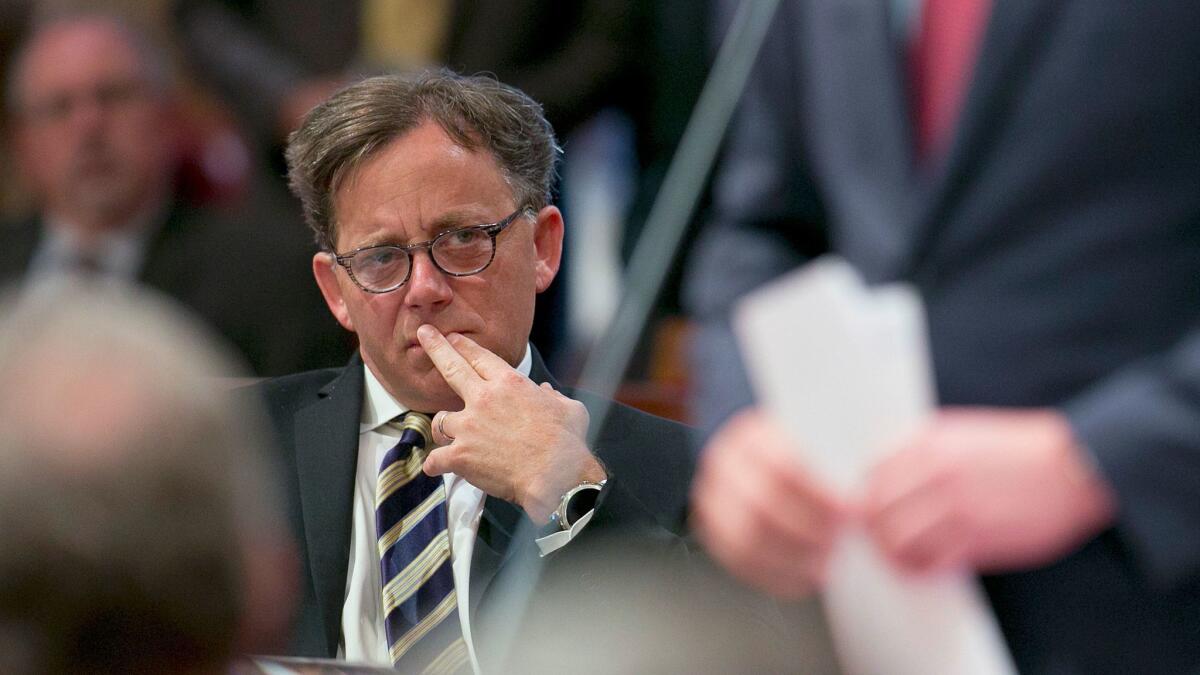
State finance officials said Monday it would cost about $2.67 million for a special election on the recall of state Sen. Josh Newman (D-Fullerton), but only $931,000 to put his potential recall on the regular June primary ballot, which will also feature races for governor and congressional seats.
The savings — and the time it took to complete the financial assessment — could give ammunition to Democratic Gov. Jerry Brown to put the recall measure on the primary ballot, possibly improving Newman’s chance of staying in office. The higher turnout expected in the primary might benefit Newman as he tries to fend off the Republican recall drive.
The financial analysis was a new requirement of a law approved this year by the Democrat-controlled Legislature that has slowed the Newman recall. Brown and legislators now have 30 days to review the election cost report.
The deadline for calling a special election was last week, 180 days before the June 5 primary, although state officials have been known to extend such deadlines. In this case, that is unlikely.
Carl Demaio, a former San Diego City councilman who is leading the Republican-funded recall, denounced the lengthy new process Monday, but said it will not save Newman’s political career.
“This is about a shameful tactic by Sacramento politicians to keep politicians who break public trust and engage in misconduct in office for as long as possible,” he said.
Republicans launched the recall after Newman voted with the majority of legislators to raise gas taxes and vehicle fees to raise more than $5.2 billion a year for road repairs and mass transit. They have turned in enough signatures to put the recall measure on a ballot.
Newman won election last year by a close margin, and Republicans see him as vulnerable to recall, which would deprive Democrats of their two-thirds majority they enjoy in the Senate.
The costs of a recall will be borne by Los Angeles, Orange and San Bernardino counties, which all have a share of Newman’s Senate district.
Derek Humphrey, a campaign consultant for Newman, said the financial report provides a preferred option.
“The recall is a waste of tax dollars no matter when they schedule it, but consolidating the election with the June Primary will save some money and allow more voters to participate,” Humphrey said. “This recall effort is another example of the partisan politics-as-usual that people are tired of.”
Representative of Brown noted there are other steps in the review process before the governor makes a decision.
Updated at 5 pm to include comment from Newman spokesman.
- Share via
The special election to replace Assemblyman Raul Bocanegra will be in spring 2018
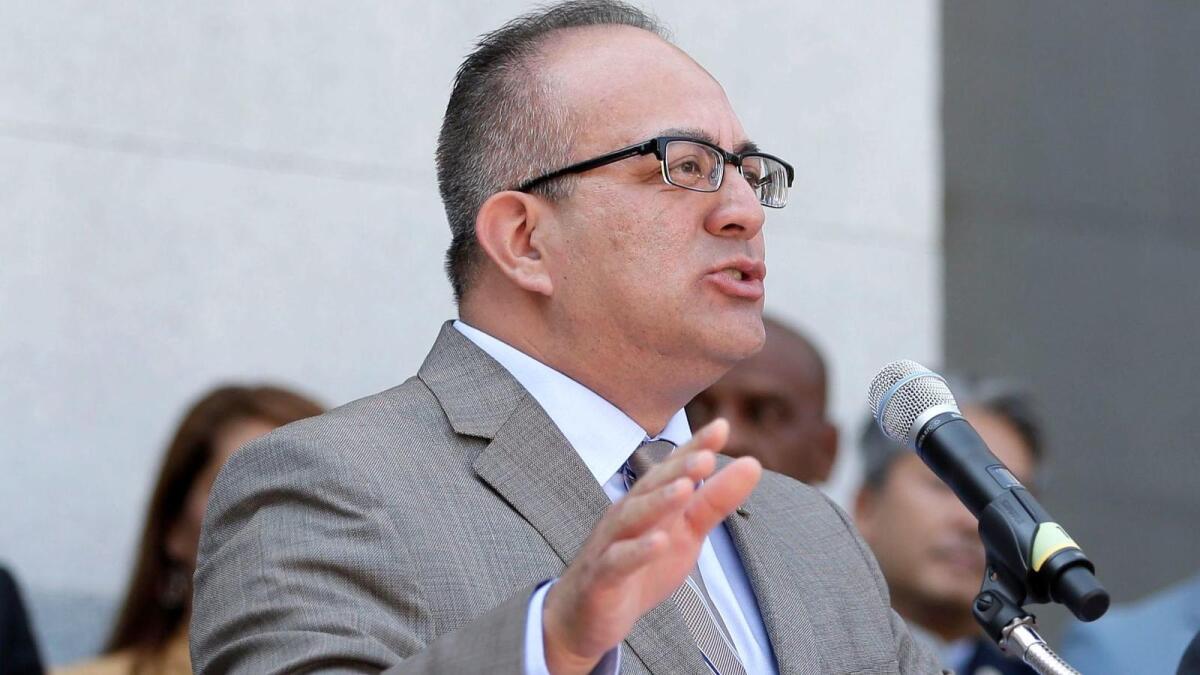
The special election to replace Assemblyman Raul Bocanegra (D-Pacoima) will be in spring 2018, Gov. Jerry Brown said Monday.
Brown said the primary election to replace Bocanegra would be April 3, with a potential runoff to follow June 5 — the same day as the state’s regularly scheduled primary election.
Bocanegra resigned last month amid a sexual misconduct investigation after multiple women accused him of making unwanted sexual advances. His resignation, combined with that of Assemblyman Matt Dababneh (D-Woodland Hills) under similar circumstances last week, put Democrats in the Assembly below the two-thirds supermajority threshold needed to pass tax increases and urgency legislation without GOP support. The soonest Democrats could regain that standing is after Bocanegra’s replacement is selected.
If a candidate receives more than 50% of the vote in April, he or she would win outright and there would not need to be a runoff to complete Bocanegra’s expiring term.
If that doesn’t happen, the race would appear twice on the June ballot — once to complete the term and a second time as a primary for the new two-year term beginning in 2019, said Dean Logan, Los Angeles County’s registrar of voters.
Patty Lopez, who upset Bocanegra in the 2014 Assembly race before losing the 2016 rematch, has already expressed interest in running again. So have at least four others: Republican Ricardo Benitez, Green Party candidate Steve Correa and Democrats Bonnie Corwin and Antonio Sanchez.
- Share via
Assemblymen Sebastian Ridley-Thomas, Frank Bigelow agree to pay fines for campaign finance violations
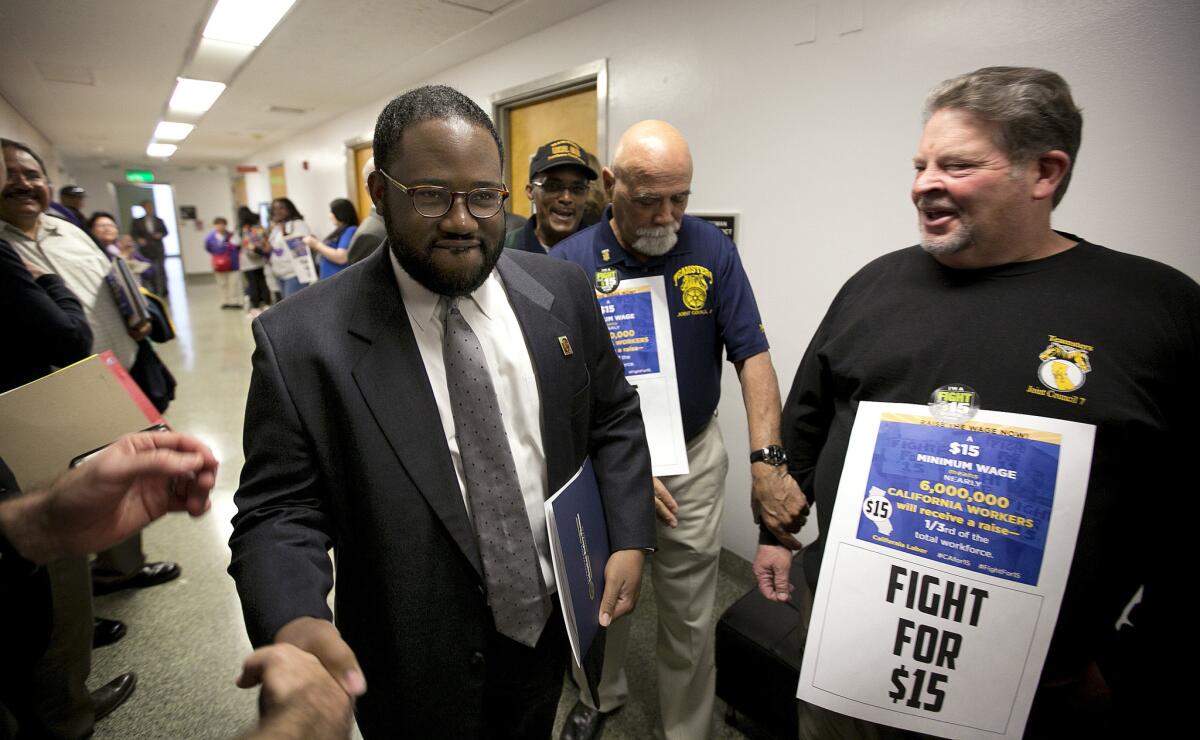
Assemblymen Sebastian Ridley-Thomas (D-Los Angeles) and Frank Bigelow (R-O’Neals) have agreed to pay fines to the state’s political watchdog agency for violating campaign finance rules, according to documents released Monday.
Ridley-Thomas has agreed to pay $3,500 in fines to the state Fair Political Practices Commission for failing to properly report contributions he received for his 2014 election.
He failed to report a contribution of $7,000 from the International Brotherhood of Electrical Workers Local 11, within 10 days as required by campaign finance rules, according to a report by the commission’s enforcement staff. He also failed to disclose contributions of $1,000 from PG&E and $8,200 from the Los Angeles County Firefighters Local 1014 Legislative Fund Committee within 24 hours, the report said.
“Higher penalties are not being sought in this case because Ridley-Thomas served as his own committee treasurer, and he was not an experienced candidate,” the report said. “He relied upon a consultant who was hired to assist with campaign reporting, and he believed that the consultant was complying with all disclosure rules.”
Bigelow has agreed to pay $2,000 in fines for failing to make expenditures for his campaign from the designated campaign bank account for his 2016 election.
Instead, he used a personal account to pay for $2,189 in expenditures for meals at restaurants with donors.
The commission will vote Dec. 21 on whether to approve the fines agreed to by Bigelow and Ridley-Thomas in talks with its enforcement staff.
The commission will also consider approving $18,000 in fines agreed to be paid by Sutter Health for failing to file in a timely manner nine lobbyist employer reports.
- Share via
Cheech Marin teaches Californians how to register marijuana businesses with the state on new website
State officials have enlisted counter-culture comedian Cheech Marin to help educate Californians that if they want to start a business to grow, distribute or sell marijuana they have to register their business with the state.
Secretary of State Alex Padilla has created an online portal for cannabis firms to register and conduct other business with the state, including registering trademarks and converting non-profit entities into for-profit companies.
California’s Bureau of Cannabis Control will begin issuing licenses to firms for growing and selling cannabis on Jan. 2, but one requirement is that they first register their business with the secretary of state.
“There is a lot of interest from entrepreneurs to be part of the next big industry for the California economy and we want to make sure people do it appropriately and that begins with registering your business,” Padilla said.
Marin, who was part of the comedy duo Cheech and Chong, appears in a video describing how easy it is to register a business online.
- Share via
Tech executive is latest Democrat to challenge Rep. Dana Rohrabacher
As 2018 approaches, the roster of challengers looking to unseat Rep. Dana Rohrabacher is already at a dozen candidates.
Rachel Payne, a former Google executive who now heads up two Southern California-based technology firms, announced Monday that she’s running against the 15-term Republican from Costa Mesa.
In a video posted to her website shortly after she announced, Payne focused on job security and stagnant wages, saying it was important to ensure “everyone has an opportunity to play the game” in a rapidly changing economy.
“We need to think about where are those jobs coming from in the future and how we’re arming people in America for them,” Payne said in an interview. She said if elected, she would fight for policies that would incentivize corporations to invest more in training American workers for skills that will still be relevant as automation and artificial intelligence begin to play a larger role in business.
Payne, 42, was born in San Bernardino, grew up Southern California and Las Vegas, and has an master’s of business administration from Stanford University. She spent several years as an executive for Google, living and working in Uganda for a time before moving to Aliso Viejo eight years ago to be closer to family.
She is now CEO of FEM Inc., a media research firm, and Prizma, a video platform that uses artificial intelligence to serve up content recommendations on the web.
Payne said she isn’t fazed by the crowded field in the 48th Congressional District and that her success as a female entrepreneur in the male-dominated world of technology has given her the tools to succeed.
“Regardless of who wins in any district, I am delighted that we have a competitive bench. This is what democracy should look like,” she said. “I think people want sanity, they want common ground, they want someone who knows how to execute and to be able to believe in their leaders again.”
Rohrabacher is considered one of the most vulnerable congressional incumbents, and the race for his seat has been rated a “toss-up” by more than one election handicapper.
- Share via
California Politics Podcast: A new state Senate leader, another lawmaker resigns
Only two people — both men in the state’s Gold Rush era — have served as the leader of both houses of the California Legislature.
A third person, a woman, will join that elite list early next year.
On this week’s California Politics Podcast, we discuss the selection of Sen. Toni Atkins (D-San Diego) to be the new Senate president pro tem. Atkins left her post as Assembly speaker less than two years ago.
We also take a closer look at major developments in the ongoing discussion of sexual misconduct in state political circles, after the decision by another Assembly member to resign and a tense public hearing into how the lower house handles sexual harassment complaints.
- Share via
‘The planet is warming and all hell is breaking loose,’ says Gov. Jerry Brown as he heads to Paris for a climate event

Renewing his criticism of President Trump’s stance on climate change as he traveled to Paris for an international meeting, Gov. Jerry Brown said on Sunday that the president’s agenda has a “reckless disregard” for the seriousness of the problem.
“Nature is not a political game. Nature is the ground on which we stand, it’s the air which we breathe,” Brown said in an interview broadcast Sunday on CBS’ “60 Minutes.” “The truth of the case is that there’s too much carbon being emitted, that heat trapping gases are building up, the planet is warming and all hell is breaking loose.”
The governor left on Sunday for an event marking the two-year anniversary of the Paris Climate Accord, a summit whose final agreement was praised by Brown but rejected by Trump this past June.
Brown was invited by French President Emmanuel Macron to represent the United States at Tuesday’s One Planet Summit, where he is scheduled to deliver a keynote speech.
In the CBS interview, Brown said everyone should fear the impact on the planet from the warming caused by the proliferation of greenhouse gases.
“Anyone who isn’t is not looking at the facts,” he said. “I don’t think President Trump has a fear of the lord, the fear of the wrath of God, which leads one to more humility. And this is such a reckless disregard for the truth and for the existential consequences that can be unleashed.”
The governor, who has made several trips across the globe in 2017 to discuss California’s efforts on climate change, will return to the state on Thursday. He is scheduled to receive an honorary degree at a Paris university on Wednesday.
- Share via
As California burns, Congress plans to slash tax write-offs for fires and other disasters
As California burns, Congress is planning to limit taxpayers’ ability to write off losses from future wildfires and other disasters.
The disaster write-off is one of the many little-known deductions set to be mostly wiped out in the GOP tax plan, but it’s getting fresh attention because of the fires that have devastated parts of Southern California over the last week.
The House tax bill entirely eliminates the deduction that allows people to claim uninsured losses after all types of disasters; the Senate version allows people to take the deduction only if the president declares a federal disaster.
- Share via
Drug manufacturers ask federal court to block California’s new prescription medicine transparency law

California’s landmark law to require new disclosure of prescription drug prices was challenged in federal court Friday, with the pharmaceutical industry accusing state officials of trying to “dictate” national healthcare policy.
If successful, the lawsuit by the Pharmaceutical Research and Manufacturers of America could either delay or derail implementation of what supporters predicted would be a major improvement in the transparency of drug pricing. The industry effort argues the state law is unconstitutional.
“The law creates bureaucracy, thwarts private market competition, and ignores the role of insurers, pharmacy benefit managers and hospitals in what patients pay for their medicines,” said James Stansel, the trade group’s executive vice president, in a written statement.
The law, Senate Bill 17, imposes a required 60-day notice to health plans and other providers when drugmakers intend to raise their prices beyond a certain threshold. The industry group said Friday that the list price identified in SB 17 applies nationwide and that the additional rule “expressly saddles the entire country” with a mandate imposed in California.
The lawsuit alleges that lawmakers wrote a bill with “openly acknowledged animus” toward the pharmaceutical industry.
The law by state Sen. Ed Hernandez (D-Azusa) also requires health insurance plans to submit annual reports to the state about which drugs are most frequently prescribed, those which are most expensive and those with the largest year-to-year price increase.
Hernandez rejected the assertion that the law could raise prices nationwide and said the industry was “refusing to accept any responsibility for the skyrocketing costs of prescription drugs.”
“The idea that anyone other than drug companies is responsible for price increases is absurd,” he said in a written statement.
Other SB 17 supporters noted the bill passed with bipartisan support in Sacramento.
“From day one they have been unable to acknowledge their outsized role in driving health care costs skyward and continue to pretend they are above the law,” Charles Bacchi, president of the California Assn. of Health Plans, said in a written statement.
7:53 p.m.: This story was updated with a comment from Sen. Hernandez.
This story was originally published at 5:56 p.m.
- Share via
Lawyer for lobbyist who accused Asssemblyman Matt Dababneh of sexual misconduct seeks details about investigation
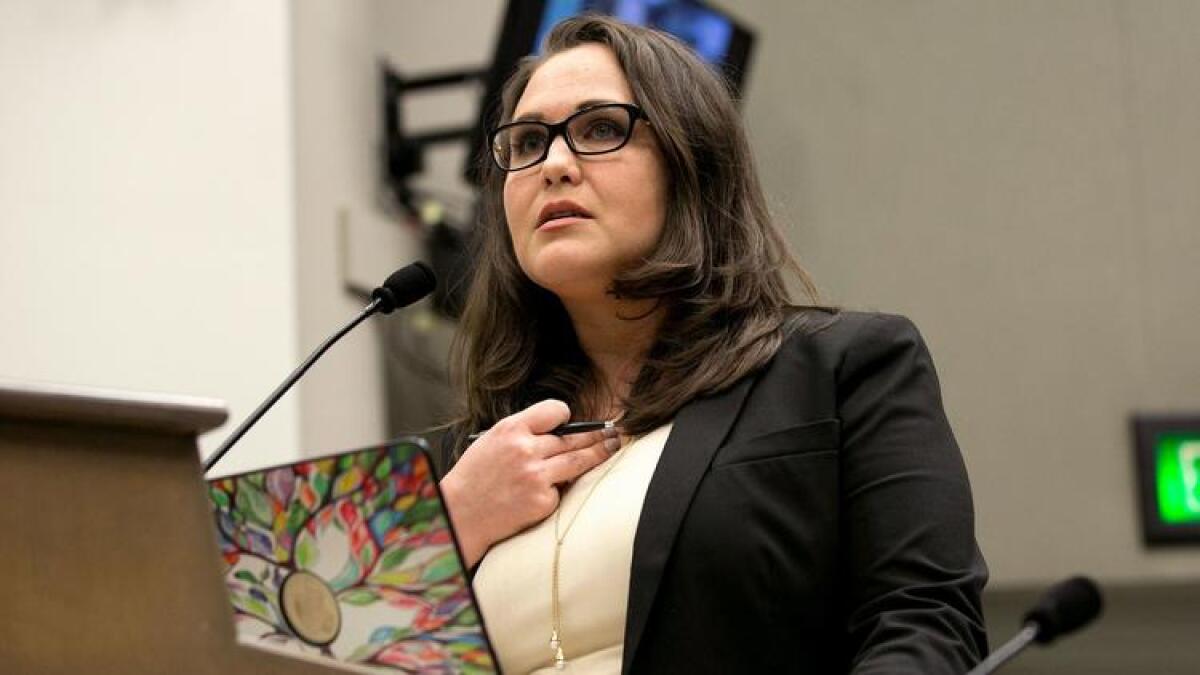
A lawyer for Sacramento lobbyist Pamela Lopez wants the state Assembly to detail how the investigation into her client’s sexual misconduct claim will be conducted, saying Lopez needs assurance that politics won’t influence the final conclusion.
Lopez filed a formal complaint letter with the Assembly Rules Committee on Monday, saying Assemblyman Matt Dababneh (D-Woodland Hills) followed her into a bathroom, masturbated in front of her and urged her to touch him.
She said she decided to name him in public after Assemblyman Ken Cooley (D-Rancho Cordova), chairman of the Rules Committee, urged sexual harassment victims in the Capitol community to come forward, promising a neutral and unbiased investigative process.
In a letter to Cooley sent Friday, Lopez’s lawyer, Jean Hyams, makes a series of requests for information, including details on who will investigate the case, what previous contact that investigator has had with Dababneh and what the scope of the investigation will be.
Hyams states she is concerned the chamber’s “current system for responding to reports of sexual harassment is broken.”
“In order for any victim to feel safe participating in an investigation, she or he needs to know that the process will be neutral and independent of the forces of politics,” Hyams writes.
A spokeswoman for Cooley referred all questions about the letter to Assembly Chief Administrative Officer Debra Gravert. In a statement, Gravert said the Rules Committee would be considering and addressing questions like those posed by Hyams.
But whether that will entail a new process is unclear.
Gravert said the Rules Committee would follow the same investigative processes and procedures already in place, though an Assembly subcommittee is still reviewing them and its leaders pledged to overhaul them. Victims denounced the chamber’s handling of sexual harassment claims at its first special hearing last month.
Dababneh has strongly denied the allegations. On Friday he announced he would step down from office at the end of the month.
- Share via
John Chiang pitches billions in new low-income housing spending and homebuilding incentives

California gubernatorial candidate John Chiang wants to tackle the state’s housing affordability crisis by spending billions more on low-income development and offering greater financial incentives to cities that permit new building.
“The housing shortage in this state is a drag on our economy and is a barrier to climbing the socioeconomic ladder for thousands of families in California,” Chiang said in a statement.
Chiang, the state treasurer, released the plan on his campaign website Friday. The policy changes he wants to make include:
- Promoting a $9-billion bond to help fund new low-income housing development and an additional $600 million in annual spending through a low-income housing tax credit. Chiang said these proposals would be on top of the $4-billion housing bond that will appear on the statewide ballot in November 2018. California’s low-income housing spending needs have been estimated conservatively at $15 billion a year.
- Offering local governments more sales tax revenue and transportation funds if they approve more housing. This is an effort to change the state’s tax system, which currently provides more tax revenue to cities that approve more hotel and office development than housing.
- Modeling new state laws after programs in Massachusetts and New York City. The Massachusetts law allows the state to override local decisions to deny low-income housing projects if a city is behind on its housing goals. The New York City law provides property tax breaks to apartment developers who reserve a certain portion of their project for low-income residents.
- Creating a state rapid rehousing program to help the homeless with short-term rental assistance and with utility and security deposits.
Chiang estimated his efforts would house 4 million additional Californians.
- Share via
California begins accepting permit applications for the sale of recreational marijuana

Just weeks before California begins issuing licenses to businesses to sell marijuana for recreational and medical use, the state on Friday began accepting applications electronically through a new online system.
The state Bureau of Cannabis Control is accepting applications for commercial marijuana licenses for retailers, distributors, micro-businesses, testing laboratories and cannabis events, according to Lori Ajax, chief of the bureau.
“Today’s launch of our online licensing system is the culmination of many months of hard work by our dedicated team,” Ajax said in a statement. “Now that applications are coming in, we can officially move one step closer to issuing California’s first state licenses for commercial cannabis activity.”
The sale of marijuana for recreational use was approved in November 2016 when California voters passed Proposition 64, which also required the Bureau of Cannabis Control to license retail sellers.
Applicants will be required to register an account with the bureau, which will not issue licenses until Jan. 2 and will only license firms that have approval to operate from their city or county. The initial licenses will be four-month temporary permits for which the $1,000 application fee and a background check requirement will be waived.
Marijuana growers must apply for a license to the California Department of Food and Agriculture, which plans to launch its application process later this month. The California Department of Public Health will issue licenses next month for manufacturing marijuana products.
- Share via
Rep. Devin Nunes cleared of allegations that he disclosed classified information in Russia investigation
The House Ethics Committee on Thursday cleared Rep. Devin Nunes of allegations that he disclosed classified information related to the House investigation of Russian meddling in last year’s election.
The committee said in a statement that experts it interviewed determined that the information the House Select Intelligence Committee chairman divulged was not classified.
When the complaint was filed in April, the Tulare Republican said he would step away from leading the intelligence committee’s Russia investigation. But Nunes did not recuse himself and many Democrats have complained he has been too involved in the investigation.
- Share via
Liberal group wades into primary fights early, endorses challengers in four GOP-held districts
More than four dozen Democrats are already running for seats in the 10 GOP-held congressional districts the minority is eyeing in California ahead of the midterm elections. Many left-leaning groups have avoided picking favorites, choosing instead to attack incumbents while they wait for the heated primaries to play out in June.
Democracy for America, the progressive political action committee started by Howard Dean, is doing things differently.
On Friday, the group announced endorsements in four California districts:
- Bryan Caforio, running against Rep. Steve Knight (R-Palmdale)
- Sam Jammal, running against Rep. Ed Royce (R-Fullerton)
- Laura Oatman, running against Rep. Dana Rohrabacher (R-Costa Mesa)
- Mike Levin, running against Rep. Darrell Issa (R-Vista)
All of them are Democrats.
In a statement, the group’s chairman, Jim Dean, said victories in California will be “absolutely critical” to Democrats’ plans to retake the House in 2018 and in opposing President Trump’s agenda.
The group said it made its choices based on conversations with candidates and input from some of its 305,000 members statewide. So far this year, Democracy for America has endorsed Emilio Huerta, who is running for a second time against GOP Rep. David Valadao; Kevin de León, who is challenging Sen. Dianne Feinstein; and Wendy Carrillo, a labor activist who won an Assembly seat on Tuesday.
In an interview, the group’s spokesman, Neil Sroka, said the crowded fields in these races — Knight, Royce and Rohrabacher each have at least six Democrats running against them — helped push them to endorse early.
“We’re choosing between a number of good Democrats, and ferreting out the one that’s best equipped to win and best equipped to stand up for our values when they get to Washington is really important,” Sroka said.
Sroka rejected the idea that lining up behind more progressive candidates in traditionally swing or Republican-heavy districts could be harmful to Democrats’ chances.
- Share via
California’s vulnerable GOP members watch closely as final tax bill is negotiated
Vulnerable California Republicans say they are watching closely as House leaders work on a final tax bill with the Senate, hoping they’ll win back some popular deductions that would lower tax bills in their districts.
California Republican votes may prove essential to the final tax bill’s chances, and some have signaled they are willing to vote against it.
Rep. Steve Knight, who was among the California Republicans who voted for the House version after being promised changes in the final bill, said he’s meeting with House leaders multiple times a day to reach a compromise.
- Share via
Republican John Cox takes shots at Sacramento ‘cronies’ and Democratic rivals in governor’s race
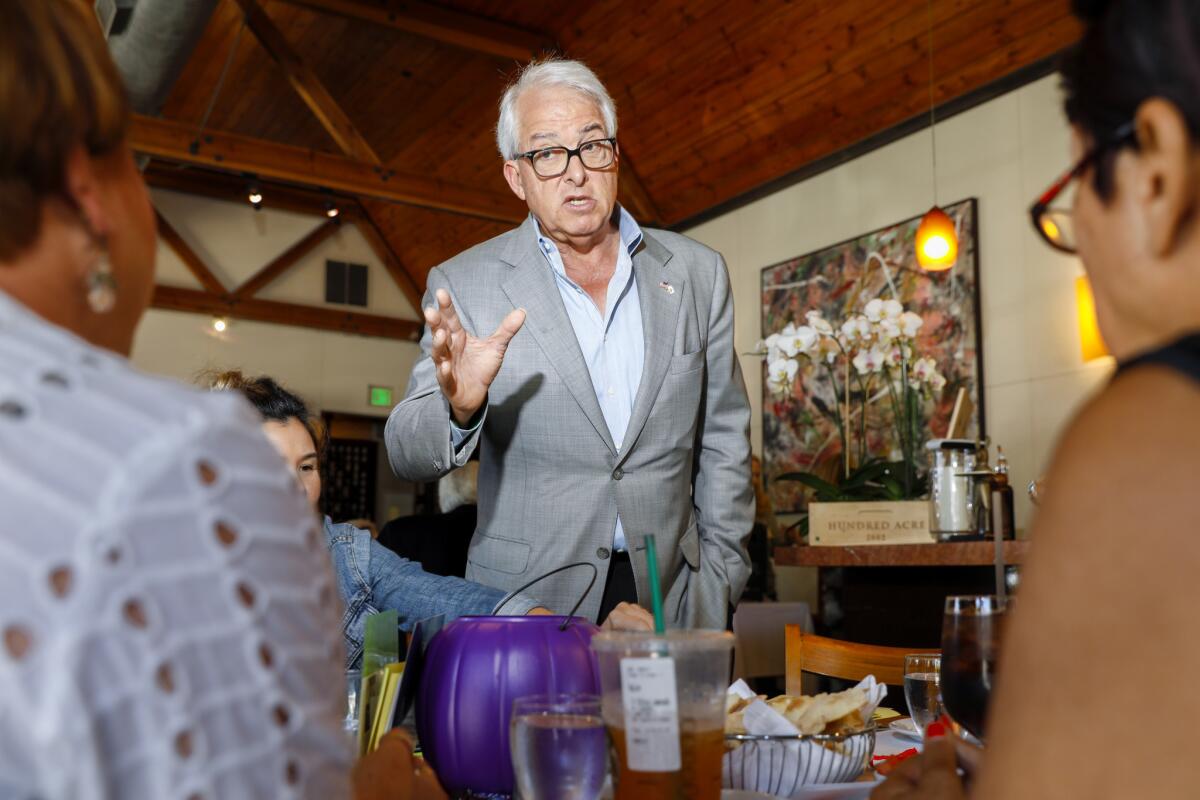
Republican gubernatorial candidate John Cox on Thursday blamed the Democrats in Sacramento for California’s most serious ills, including high levels of poverty and unaffordable housing costs.
Cox, speaking at the Public Policy Institute of California in San Francisco, promised to tamp down the clout of special interests and apply “common sense” and conservative fiscal discipline to put California back on the right path.
“This state under the current one-party crony rule has become unaffordable, especially for the middle class,” Cox said.
Cox also delivered a few jabs to his Democratic rivals in the governor’s race.
Cox said Lt. Gov. Gavin Newsom has proposed so many new government plans and programs that his platform “sounded like the Soviet Union.”
Cox, 62, also said he’s content to serve his full term as governor and is not looking to use the office as a springboard to the White House “like one candidate in this race.” It’s unclear whether Cox was referring to Newsom or one of the other major Democrats in the race, former Los Angeles Mayor Antonio Villaraigosa and state Treasurer John Chiang.
A USC Dornsife/Los Angeles Times poll released in early November found Cox to be in fifth place, with 11% of likely voters supporting him. He trailed Newsom, Villaraigosa, Chiang and GOP rival Travis Allen, an assemblyman from Huntington Beach.
The San Francisco event was moderated by Public Policy Institute President Mark Baldassare and was part of a series of public interviews of the candidates running for California governor.
Cox, a wealthy businessman and venture capitalist from Rancho Santa Fe in San Diego County, hewed toward traditional conservative views on the economy and government regulation.
He’s called for the repeal of the new gas tax, which the governor and Legislature approved for transportation projects. Cox is also calling for the repeal and replacement of the California Environmental Quality Act, saying its regulations have been an impediment to building desperately needed housing in California.
Cox pitched his proposed statewide ballot measure for a “neighborhood legislature,” which would create tiny subdistricts within the state’s current 80 Assembly and 40 Senate districts.
- Share via
Key California environmental law not a barrier to development, new state report says
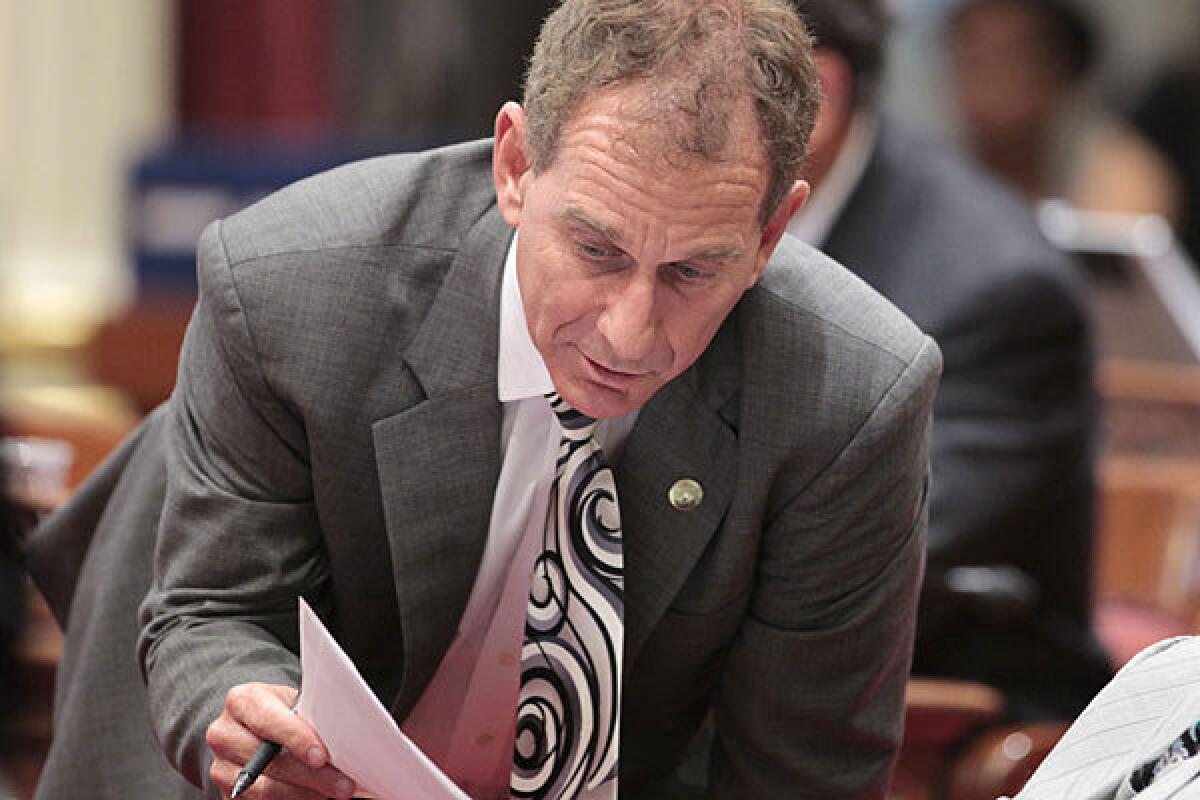
The state’s primary environmental law governing development doesn’t block development from actually happening, according to a state study released Thursday.
The study examined, over five years ending in 2016, how state transportation, parks and other projects were handled under the California Environmental Quality Act, or CEQA. The law requires developers to disclose and often lessen their project’s effect on the environment before proceeding with construction. The study found that 1% of projects required detailed analyses under the law and less than 1% of them were sued.
----------
FOR THE RECORD, 4:45 p.m.: A previous version of this post said the study evaluated state housing projects. No housing developments were examined as part of the study.
----------
“This extensive review of state agencies clearly finds that CEQA is doing what Gov. Reagan and the Legislature hoped it would do when they passed it in 1970 — providing transparency, accountability and reducing harmful impacts to our environment as we undertake important projects to enhance our state,” said Sen. Bob Wieckowski (D-Fremont), chair of the Senate Environmental Quality Committee, which commissioned the study.
CEQA has long been a lightning rod in state politics, with some crediting the measure for preserving the state’s environment and others arguing it has slowed the building of housing, transit lines and other infrastructure.
Results from recent analyses of CEQA have been mixed. A 2016 environmentalist-sponsored report mirrored the results of Thursday’s state study, finding that few projects were sued compared to the rate of development. A 2016 examination from a law firm that promotes overhauling the law determined that litigation between 2013 and 2015 challenged 10,000 homes in Southern California neighborhoods planned for the most growth.
- Share via
California’s Senate will be led by a woman for first time in history: Sen. Toni Atkins
State Senate leader Kevin de León said Thursday that the Senate Democratic Caucus is supporting Sen. Toni Atkins (D-San Diego) to take over for him as Senate president pro tem in 2018 after an election in January.
De León, a Los Angeles Democrat who has served as Senate leader for nearly four years, is stepping down from the leadership position as he runs against Sen. Dianne Feinstein in the 2018 election for her seat in the U.S. Senate.
“Four years ago, our caucus elected the first Latino leader in over a century to lead the California state Senate — and, next year, Sen. Atkins will become our first ever woman to be elected Senate leader,” De León said in a statement.
“Toni is a leader of great experience, achievement and integrity, and I have every confidence that she will lead America’s most accomplished legislative chamber to even greater heights,” De León added.
Atkins, 55, brings leadership experience to the job, having previously served as speaker of the state Assembly. She will be the third person to serve both as Assembly speaker and Senate president pro tem and the first leader of the state Senate who has come out as gay.
“Today, I am humbled by the trust my colleagues have placed in me, and I intend to earn that trust every day by working tirelessly and inclusively to keep California a place of opportunity for everyone,” Atkins said in a statement.
She noted that California has become a counter-force to the Republican policies of President Trump and Congress.
“Given our national divisions, California’s example is more important than ever — and I look forward to working with our president pro tem and all of our colleagues to ensure that the Senate continues to rise together to meet the challenges faced by the great people we represent,” Atkins said.
De León did not provide a date for the transition of leadership in 2018, saying it would happen “later in the year.”
The announcement of the first woman Senate leader comes less than a month after 140 female legislators, lobbyists, political advisors and Capitol staff members signed a letter criticizing the “pervasive” culture of sexual harassment and misconduct in state government. The signers said they had all witnessed “dehumanizing behavior by men in our workplace.”
One assemblyman has resigned and two other male legislators are under investigation for allegations of sexual harassment.
Senate Republican Leader Patricia Bates of Laguna Niguel noted it will be the first time both leaders of the Senate are women, and offered to work with Atkins “to substantially address the issues raised by reports concerning inappropriate behavior,” the harassment.
De León has instituted changes to address the problem, including a plan to hire an outside law firm to investigate any allegations.
During his term as leader, De León has also overseen a string of accomplishments on environmental, social and immigration issues.
“For nearly four years, it’s been a profound honor to lead a unified, progressive and collaborative California state Senate. Together, we’ve put the public interest over individual ambitions and made enduring progress on behalf of millions of Californians,” De León said.
UPDATES:
1:20 p.m. This article was updated with information about an open letter about sexual harassment and to include a comment by Sen. Bates.
This article was originally published at 11:15 a.m.
- Share via
Paul Ryan-linked group urges California Republicans to hold firm on tax bill
American Action Network is pushing back on the onslaught of anti-tax plan ads in California with spots urging four Republicans who voted for the GOP tax bill not to change their minds.
The six-figure digital and TV ad buy from the politically active nonprofit with ties to House Speaker Paul D. Ryan (R-Wis.) encourages people to call and thank Reps. Jeff Denham of Turlock, David Valadao of Hanford, Steve Knight of Palmdale and Mimi Walters of Irvine for their votes.
Denham and Valadao have been on board with the tax plan from the beginning, but Knight and Walters have both wavered, saying they only voted for the House plan because they received assurances that the final bill would be better for their constituents.
The House plan reduces or eliminates popular tax deductions used heavily in their wealthy districts, and Knight and Walters are both pushing for them to be included in some form in the final bill.
A Los Angeles Times analysis found that in 2015, 47% of taxpayers in Walters’ Orange County district and 42% of taxpayers in Knight’s Antelope Valley District used the state and local tax deduction that is under threat in the plan.
The ads are part of a $2-million ad campaign targeting 24 congressional districts across the country.
- Share via
Pelosi lambastes California Republicans for supporting tax bill that ends wildfire loss deductions
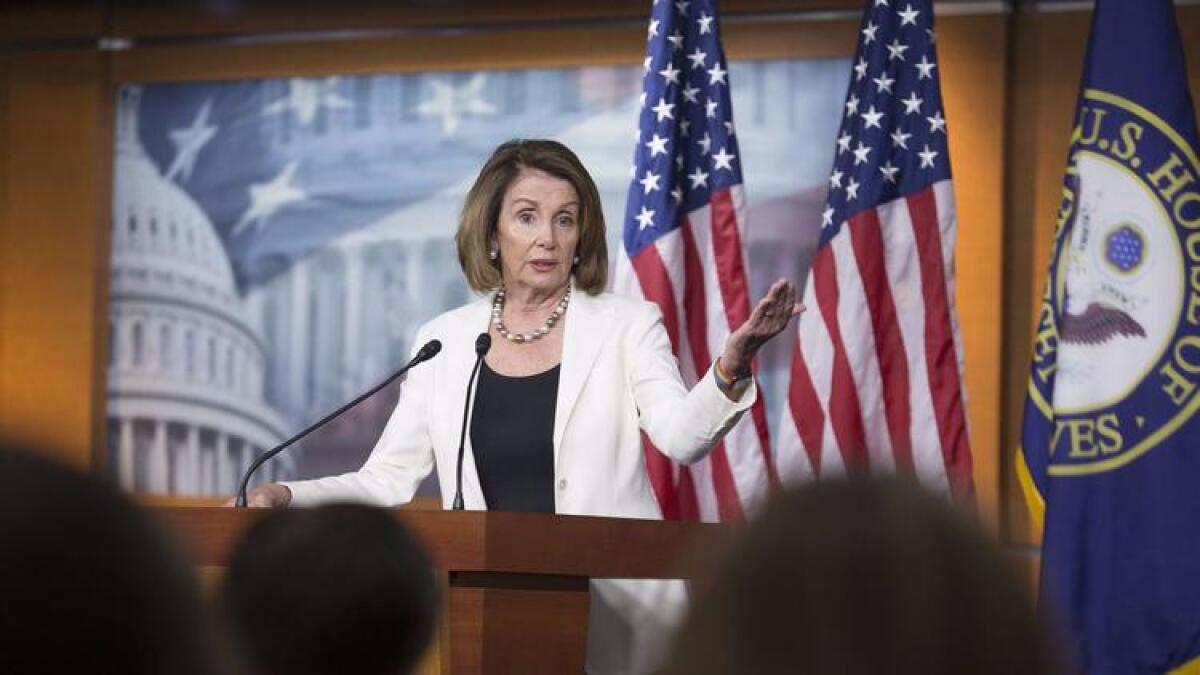
House Minority Leader Nancy Pelosi (D-San Francisco) on Thursday criticized Republicans in the California delegation for approving a tax bill that eliminated the deduction for personal losses from wildfires, earthquakes and other natural disasters, but kept the break for victims of the recent severe hurricanes.
“They actually voted for that bill,” Pelosi said during her weekly news conference. “[The members] voted to discriminate against victims of fire. We certainly want to have the deduction for victims of hurricanes and the rest, but why are they doing this to our state?”
The Senate version of the tax bill modifies, but doesn’t eliminate, the fire and earthquake deduction so it can be claimed only in the case of a federally declared disaster. Many California fires do not get that designation. It is one of the items that has to be resolved in the final bill currently being negotiated.
House Majority Leader Kevin McCarthy (R-Bakersfield) said Rep. Mimi Walters (R-Irvine) is pushing to get relief for the most recent California fires passed this year, and that is expected to include a provision to allow fire victims to deduct their losses.
He noted in a statement Thursday that the entire California delegation just signed a letter in support of fire disaster aid for California in a supplemental funding bill.
“I look forward to passing that supplemental funding package — which will include tax relief that Leader Pelosi and I agree on — and I look forward to her support for tax reform that incorporates this wildfire tax relief and allows the deduction for personal losses and other tax relief for Californians and other victims of the recent disasters,” he said.
Pelosi singled out the California Republicans who voted for the House tax bill by name twice, adding to the deluge of ads and protests hoping to sway their votes.
“It’s once again important to note that 11 Republicans in California voted to do violence to the economy of our state,” Pelosi said.
People across the political spectrum are paying close attention to California Republicans’ votes on the final version of the tax bill.
Several representatives, especially those in Orange County, said they supported the House version because they got assurances that concerns about the loss of deductions for their constituents would be resolved in the final version.
Pelosi noted that the House bill passed with an 11-vote margin, and that if the California members had voted against it, the bill would have failed.
------------
UPDATES
2:27 p.m.: This article was updated with a comment from McCarthy.
This article was originally published at 8:58 a.m.
- Share via
Graduate students in Rep. Mimi Walters’ district air concerns over GOP tax bill with her Democratic challenger

Deyanira Nevarez Martinez has already spent three years working toward a doctorate in urban planning and public policy at the University of California in Irvine. She’s about halfway done, but if the GOP tax bill changes the way her graduate student income is taxed, she might have to reconsider whether getting her degree is worth it.
She was among about a dozen UC Irvine graduate students who aired their concerns Wednesday at a roundtable at a pizza place across the street from campus. The event was hosted by Democratic congressional candidate Dave Min, a UC Irvine law professor who is challenging vulnerable Republican Rep. Mimi Walters.
Nevarez Martinez says she’s seen reports that suggest her tax bill could go up by thousands of dollars if Republicans decide to tax tuition waivers or eliminate the student-loan interest deductions that often keep low-paid graduate students afloat.
“When you’re just scraping by, where are you supposed to get that extra two or three thousand dollars?” she said between bites of pizza. She’s a voter in Walters’ district and says she plans to help the local Democratic Party with voter registration efforts and other activities in the 2018 midterms.
The students, many of whom make well below $40,000 a year in stipends for their research work, discussed concerns such as being able to pay their bills, or seeing the quality of graduate student pools decrease if only the rich can afford the financial hit.
The House version of the bill, which passed last month with the support of Walters and 10 other California Republicans, would strip the tax-exempt status of the free tuition benefit given to many graduate students. It would also repeal the deduction for interest payments on student loans. Neither of those provisions are in the Senate version.
The Senate and House are still hashing out the differences in the two versions, but Min said the potential changes would be devastating for students on already tight budgets.
Michelle Zuñiga, who is also studying urban planning, said GOP representatives like Walters who voted for the House bill are underestimating the power of people like her. “Right now, a lot of us maybe are in kind of a state of shock, we just heard about this in the last month,” she said. “But in the short span of time, we’ve seen the [graduate student] union come together, we’ve seen some of our departments come together … Once we’re equipped, I feel like we’ll have more voting power.”
- Share via
California legislators to introduce bipartisan bill to give victims of sexual harassment more time to file claims
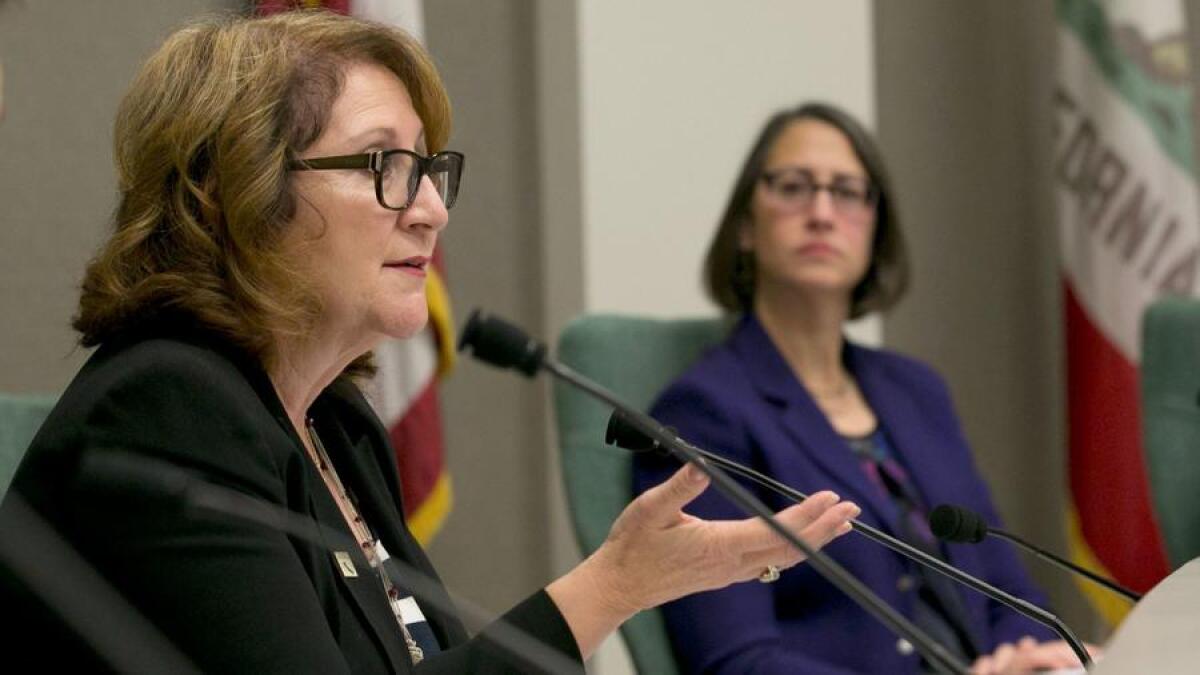
A bipartisan group of legislators said Wednesday they plan to introduce a bill next month to give victims of sexual harassment additional time to file claims.
The proposal, by Assemblywomen Eloise Gomez Reyes (D-San Bernardino), Laura Friedman (D-Glendale) and Marie Waldron (R-Escondido), would give both public and private employees more time to come forward with a claim. A spokesman for Reyes said the legislators are working to determine what the new timeframe should be.
Under existing state law, a person has one year from the date of the last incident of sexual harassment to file a claim with the California Dept. of Fair Employment and Housing. That department, which is the state’s civil rights agency, enforces California laws that bar sexual harassment and other forms of discrimination.
All three legislators are on a panel that last week examined the Assembly’s own procedures for handling sexual harassment complaints.
“The stories of sexual harassment told by victims from all careers and walks of life have revealed that the existing systems for seeking justice are not working,” said Reyes in a statement. “The evidence clearly indicates that the fear of retaliation and the psychological wounds caused by such actions can prevent victims from filing claims within the existing timelines required under current law.”
- Share via
A dozen California Democrats join effort to begin debate on impeaching Trump
The House voted overwhelmingly Wednesday against considering a resolution to impeach President Trump, but 12 of California’s 39 Democrats voted to move forward on impeachment.
Texas Democratic Rep. Al Green forced a vote on his proposed articles of impeachment Wednesday over the objections of Democratic House leaders. The move put the 57 Democrats who voted with him at odds with House Minority Leader Nancy Pelosi (D-San Francisco) and Minority Whip Steny Hoyer (D-Md.). They have urged their members to wait on impeachment talk.
“Right now, congressional committees continue to be deeply engaged in investigations into the president’s actions both before and after his inauguration. The special counsel’s investigation is moving forward as well, and those inquiries should be allowed to continue. Now is not the time to consider articles of impeachment,” Pelosi and Hoyer said in a joint statement.
The California Democrats who voted to move forward were Reps. Nanette Barragán of San Pedro, Karen Bass of Los Angeles, Mark DeSaulnier of Concord, Jimmy Gomez of Los Angeles, Jared Huffman of San Rafael, Barbara Lee of Oakland, Ted Lieu of Torrance, Jerry McNerney of Stockton, Grace Napolitano of Norwalk, Brad Sherman of Sherman Oaks, Juan Vargas of San Diego and Maxine Waters of Los Angeles.
Over the summer, Sherman introduced articles of impeachment of his own, but told Pelosi that he wouldn’t force a vote without consulting the House Democratic caucus first.
FOR THE RECORD
A previous version of this post incorrectly reported the number of California House Democrats as 53. There are 39 House Democrats from California.
UPDATES
2:40 p.m.: Updated with information about Sherman’s impeachment effort.
This post was originally published at 12:12 p.m.
- Share via
Los Angeles area congresswoman arrested during immigration protest on Capitol Hill
Rep. Judy Chu was arrested at the U.S. Capitol on Wednesday during a demonstration calling on Congress to find a legislative fix for the legal status of hundreds of thousands of people brought into the country illegally as children.
Chu (D-Monterey Park), sitting in the first row of protesters on the Capitol steps and holding a banner that said “Defend our immigrant communities,” was among the first people arrested after Capitol Police repeatedly ordered the protesters to leave.
Before the arrest, she attended a nearby rally in support of the so-called Dreamers and made it clear she intended to get arrested during a demonstration afterward, even posting a photo of her “civil disobedience starter kit.”
Chu spoke at the rally, telling the crowd “let’s make sure America remains a land of opportunity.” She said her choice to be arrested wasn’t a difficult decision.
“This is such a critical week and month in the lives of these Dreamers. I have heard from them, I have heard their anxiety and their incredible fear,” Chu said. “It’s a very urgent matter and we have to put our actions where our mouths are.”
Capitol police have not responded to questions about the arrests, but Capitol Hill protesters are typically charged with unlawful conduct, a violation of District of Columbia’s code.
An estimated one-quarter of the 800,000 people who were granted work permits under the discontinued Deferred Action for Childhood Arrivals Program live in California, and members of the state’s congressional delegation have put intense pressure on their colleagues to quickly find a fix to the current situation.
President Trump announced in September that he would end the program, giving Congress until March to come up with a legislative fix. He halted renewals of the two-year permits soon after, which means an estimated 122 people could lose protection from deportation and permission to legally work in the United States every day.
Democrats, and some Republicans, are pushing for a legislative fix before the end of the year, perhaps as a part of the spending bill Congress has to approve to keep the government open. However, House and Senate Republican leaders have said there is plenty of time to address the issue before the March deadline, and that Congress has other priorities right now.
- Share via
California lobbyist who spoke out against sexual harassment in the Capitol featured on Time’s ‘Person of the Year’ cover
Time magazine has bestowed its annual “Person of the Year” honor to the people who have spoken out against sexual harassment and abuse—including a San Francisco-based lobbyist who helped ignite the conversation in the California Capitol.
Adama Iwu, one of the founders of the We Said Enough group that has called attention to sexual misconduct in state politics, is one of five women featured on the magazine’s cover, which was unveiled Wednesday morning.
Recognized collectively as “The Silence Breakers,” Iwu, a government affairs expert for Visa, appeared with actress Ashley Judd, singer Taylor Swift, former Uber engineer Susan Folwer and Isabel Pascual, a strawberry picker whose name was changed to protect her identity. They, along with many others, are featured in the cover story on people who exposed harassment and abuse in an array of industries.
“For giving voice to open secrets, for moving whisper networks onto social networks, for pushing us all to stop accepting the unacceptable, the Silence Breakers are the 2017 Person of the Year,” wrote Edward Felsenthal, the magazine’s editor-in-chief.
“It was a huge honor,” Iwu said of being included in that group of women.
The We Said Enough group, in a statement, noted that its Oct. 17 letter, published in the Los Angeles Times, was the “first open statement by women working in politics calling for an end to the pervasive culture of harassment and assault within a Capitol community.”
“Today we stand on the shoulders of the women who came before us,” the statement says. “Our hope is that in this moment, we can all come together and secure lasting change.”
- Share via
Californians vote along party lines as House passes bill to allow concealed guns across state lines

The GOP-controlled House voted along party lines on Wednesday to pass legislation that would require states to recognize concealed carry permits from all other states regardless of a state’s permitting standards.
Rep. Jeff Denham (R-Turlock) said after the vote that he’s more worried about Californians being able to carry their concealed weapons when they travel to other states than about people bringing concealed weapons to California from states with lower permitting requirements.
“I think California does a very good job making sure that not only are people trained but they have background checks. I’d like to see other states do that as well, but certainly from a California perspective, I think that Californians should be able to carry their weapons with them in their vehicles as they travel to other states,” Denham said.
State standards for getting a concealed weapon permit vary widely. In California, sheriffs or police may issue permits only to people who make a strong case for why they need to carry a firearm, such as people whose business involves transporting large amounts of cash. In some other states, anyone who passes a gun safety class can carry a concealed weapon.
Allowing concealed carry permits to be valid across state lines has long been a National Rifle Assn. priority. The vote could potentially be used against California Republicans during the 2018 campaign, especially in urban and suburban districts like Orange County.
In an effort to tempt Democrats to vote for the bill, the concealed carry bill was combine with legislation that encourages federal agencies and states to send updated criminal records to the FBI’s National Instant Criminal Background System. Gun safety advocates called for the legislation following reports that a shooter who killed 20 people in a Texas church this year had a criminal background that was not properly reported.
The Concealed Carry Reciprocity Act, which was co-sponsored by 13 of California’s 14 Republican members, now goes to the Senate, where its chances are unclear in part because Republican senators have balked at linking the two pieces of gun legislation.
- Share via
California’s attorney general takes his attacks against the Trump administration to Washington
California Atty. Gen. Xavier Becerra complained in a speech to journalists Wednesday that the Trump administration is failing to release documents that might explain its decisions on immigration and environmental issues.
Addressing the National Press Club in Washington, D.C., Becerra said he was outraged that Environmental Protection Agency Administrator Scott Pruitt has not responded properly to Becerra’s Freedom of Information Act request for documents on possible conflicts of interest within the agency.
California has had to sue for the records, Becerra said. Refusing to provide the documents, he said, “is, I believe, an absolute abuse of power and discretion.”
California has also gone to court to seek documents that might reveal the basis of Trump’s decision to discontinue the Deferred Action for Childhood Arrivals (DACA) program that has allowed young immigrants known as Dreamers to stay in the country.
“What is this administration trying to hide when it doesn’t want to reveal to us the basis of their decision to try to deny 200,000 DACA Dreamers in California the chance to remain?” Becerra said.
Becerra admiringly described DACA participants who are loudly demanding an extension of their time in this country as “tough.” He said they have been emboldened enough to even shout him down. “That’s the American way,” he said, adding, “I believe the DACA Dreamers are here to stay.”
Becerra also predicted that the pro-immigrant, pro-clean-energy policies of California will reach the rest of the country.
“What happens in California ultimately happens in the rest of the nation,” he said.
The attorney general also criticized the Republican tax overhaul legislation pending in Congress, saying it will increase federal budget deficits and hurt the middle class while benefiting the wealthy.
“The lion’s share of benefits will flow to mega-corporations and those who are wealthy enough to own a lot of stock in those corporations,” Becerra said.
- Share via
Outside Rep. Ed Royce’s office, protesters don top hats, call GOP tax bill a tool for the rich
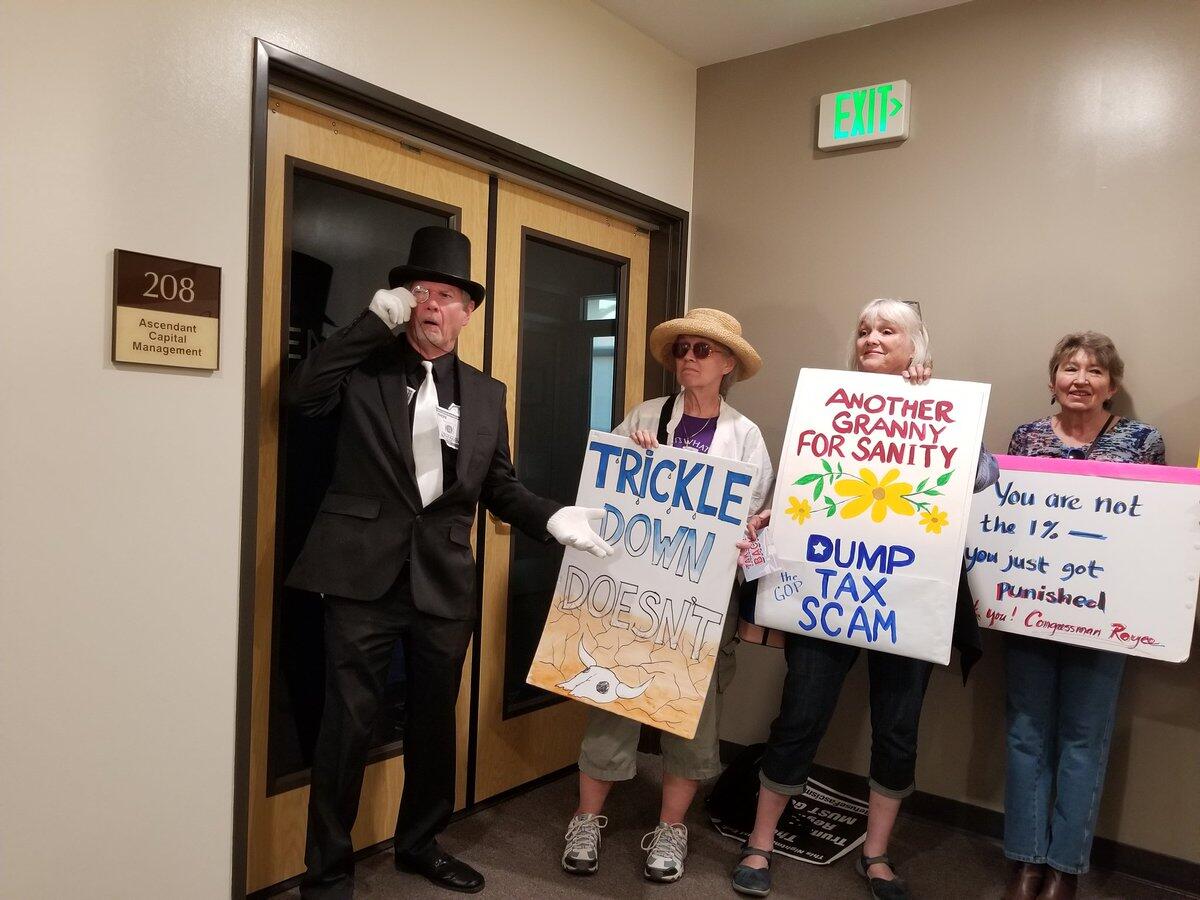
Protests over the GOP tax bill continued Wednesday, with several dozen opponents picketing outside Republican Rep. Ed Royce’s district office in Brea.
Some of them donned black blazers and top hats — one had a monocle — echoing widespread criticism that the measure is primarily designed to benefit wealthy Americans and corporations. They chanted, “Shame on you!” and held signs denouncing the “GOP tax scam,” before filing in, a few at a time, to fill out comment cards with Royce’s district office staff.
Royce, one of 11 California Republicans who voted for the House version of the tax bill last month, has stayed mum about whether he’ll support the final bill, which still needs to be crafted by negotiators from both houses of Congress.
“I think it’s going to hurt him,” said Mary Mogge, 74, a retired physics professor who lives in Royce’s district. “There’s going to be a lot of people mad at him.” She was holding a sign that read, “If you are not the 1% you just got punished.” Mogge said voters in Royce’s wealthy Orange County district are more likely to itemize their income tax deductions, meaning they could be hurt if deductions for mortgage interest or state and local taxes are eliminated or reduced.
Miguel Hernandez, a 51-year-old maintenance supervisor who showed up with several other pro-Trump counter-protesters, said he agrees that Royce’s vote in favor of the House version of the tax bill could hurt him in the midterm elections next year.
But even if his own tax bill goes up, Hernandez said, it’s a “step in the right direction” and could be a wake-up call for Californians “so they see that we’re so overtaxed.”
The demonstration at Royce’s office happened two days after hundreds of people gathered outside the district office of Rep. Darrell Issa (R-Vista), who voted against the previous House version and has said he opposes the Senate version, too. Republican Reps. Dana Rohrabacher of Costa Mesa and Tom McClintock of Elk Grove, both of whom were also “no” votes last month, have also been under pressure to withhold their support if the deductions aren’t preserved.
- Share via
Progressive group launches television ad aimed at swaying Rep. Steve Knight on tax vote
The onslaught of anti-tax reform ads aimed at vulnerable California Republicans continues Wednesday with a six-figure television ad targeting Rep. Steve Knight.
The ad calling on the Palmdale Republican to vote “No” will run on broadcast and cable channels in the expensive Los Angeles media market, and will also appear on Spanish-language channels. It is funded by Not One Penny, a coalition of progressive groups.
“Knight sided against California once, but he’s got one more chance to get it right,” the ad states.
Just three of California’s 14 Republican members joined Democrats in opposing the tax bill last month, saying changes to the state and local tax deduction and mortgage interest deduction would have an outsized impact on their constituents.
Knight and a few other Republican Californians said they voted for the bill with assurances from House leadership that their concerns would be resolved in the final version of the bill.
Not One Penny has run digital ads trying to convince Republican Reps. Jeff Denham of Turlock, Ed Royce of Fullerton, David Valadao of Hanford and Mimi Walters of Vista, but the shift to broadcast and cable media indicates they think Knight could be swayed.
All of the targeted members are considered among the most vulnerable going into the 2018 midterm election.
- Share via
Four California Republicans targeted by group that wants to overturn Citizens United
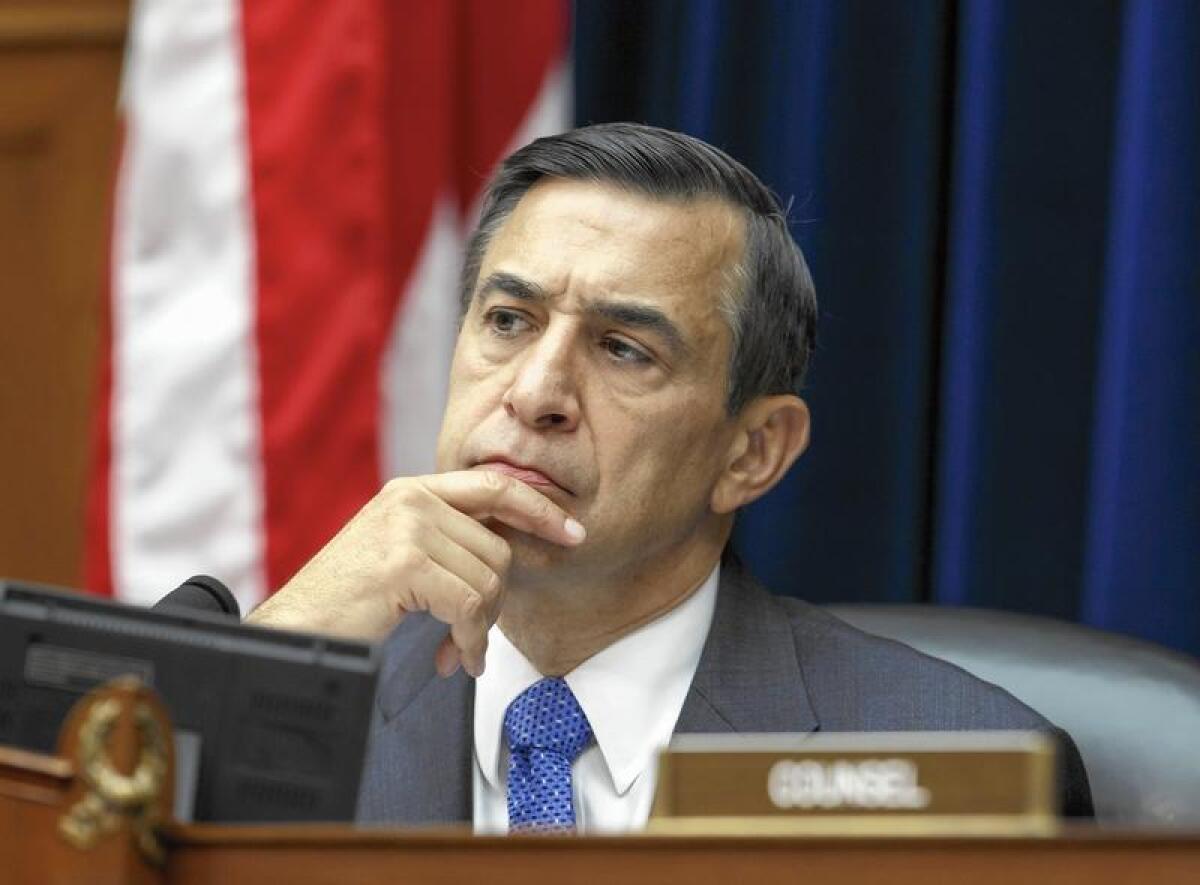
A political action committee aimed at overturning Citizens United says it plans to spend millions in the 2018 midterms to elect Democrats who support campaign finance reform.
On Tuesday, it announced that its top 20 targets include Rep. Mimi Walters (R-Irvine), Rep. Dana Rohrabacher (R-Costa Mesa), Rep. Darrell Issa (R-Vista) and Rep. Duncan Hunter (R-Alpine). All four are on a watchlist for next year’s most vulnerable California House members.
“California represents some of the best opportunities and, frankly, some of the most egregious examples that we have seen,” said End Citizens United executive director Tiffany Muller in a call with reporters. Muller noted the fact that Hunter is currently under investigation for potential misuse of campaign funds, and the campaign contributions Issa has received from telecom companies.
End Citizens United was formed in 2015, and spent about $25.5 million in the 2016 election. Muller said the group plans to go after independent voters it says prioritize money in politics as a top issue.
Federal Election Commission reports show the group has already raised $11.5 million as of Oct. 30. The group’s leaders declined to say how much of the money will likely be spent on the four California districts.